






AGCAS’s Job profiles and What can I do with my degree (WCIDWMD)? series offer a wealth of information, not only for students and graduates, but also for our members and careers professionals These titles, which are produced in collaboration with Prospects, offer detailed advice on a huge range of job roles and what work areas you can explore with your chosen degree
Many Job profiles and WCIDWMD? titles feature case studies from recent graduates in real jobs or undertaking further study or training, offering prospective students a real life insight into potential careers
There are 500 Job profiles which cover a range of roles that new and recent graduates are most interested in. Profiles provide information about:
qualifications and other entry requirements salaries work experience vacancy sources professional development career prospects
The 100 titles in the WCIDWMD? series provide an overview of the different options open to current students and graduates from particular degree subjects They highlight the skills gained through study, provide examples of typical jobs, and give statistics on what graduates have gone on to do six months after graduation
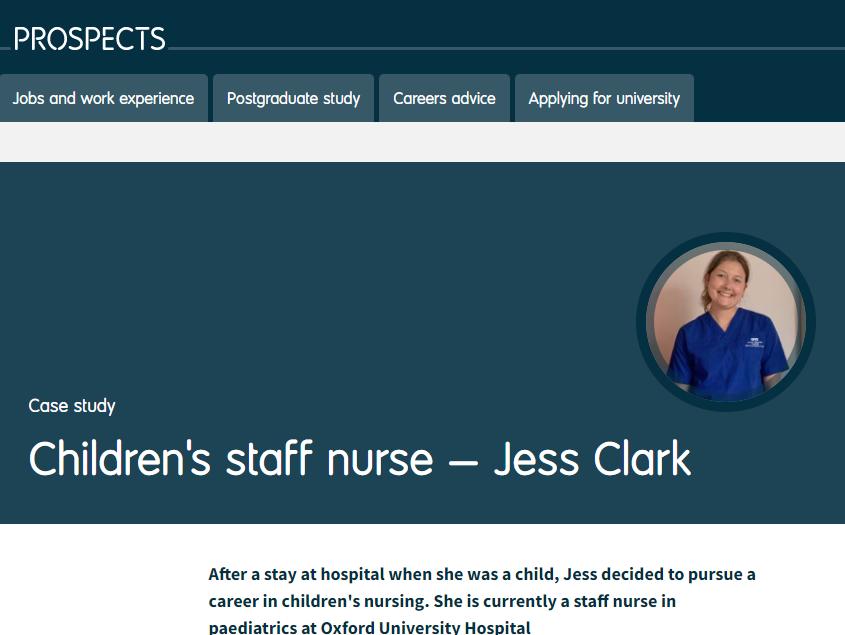
We are always looking for case studies from recent graduates (within five years of graduation if appropriate) to provide a personal insight into the many professions covered by the Job profiles and the next steps that graduates take after completing their degrees covered by the What can I do with my degree? series
Case studies are often sourced via:
alumni departments with access to recent graduates course providers employers professional bodies and associations government departments contacts made on LinkedIn

Members who have relevant contacts who would be willing to provide a case study are encouraged to contact the Publications Team at publications@agcas org uk
Completing a case study is a quick and simple process and we have a case study template the participant can fill in They get to approve the final version ahead of publication and it can be a great advertising opportunity for them, their employer and your university
The list of Job profiles and WCIDWMD? titles that we are looking to source case studies for can be found on the AGCAS website: www agcas org uk/Case studies
Find out more at www agcas org uk/Prospects and at www prospects ac uk
A case study provides a detailed look at one person’s journey. This offers a more personal view of what steps someone took to achieve an outcome, and how they went about looking for a job and how they secured it. This includes what they studied before starting the job, and how their degree or studies helped with this Additionally, the case study participant sheds light on their daily tasks as well as what they find challenging and rewarding in their role. Most case studies also feature top tips and advice for the role, their studies and how to move forward with a career after graduation.
Case studies offer a real world example of one person ’ s experience, shedding light on where to go and what to do after graduation
Why are case studies so important?
06
08
10
MAKING CAMPUS ATTRACTION WORK FOR EMPLOYERS: ALIGNING EMPLOYER LED EXPERIENCES TO THE STUDENT JOURNEY University of Liverpool
SUPPORTING LOCAL SMES TO ACCESS TALENT University of Nottingham
RESPONDING TO CHANGE: EMPLOYER ENGAGEMENT IN A POST-PANDEMIC WORLD Employer Engagement Task Group
22
23.
PERSONALISED EMPLOYER ENGAGEMENT THE AIR MODEL Queen Mary University of London
SUPPORTING THE PLACE BASED GRADUATE EMPLOYMENT AGENDA University of York
24
ELEVATE: HOW A TARGETED EMPLOYABILITY PROGRAMME AIDS EMPLOYER ENGAGEMENT Kingston University
26
EMPLOYER ENGAGEMENT: A NEW ERA PLUS 37 THE BENEFITS OF USING AN ONLINE MENTORING PLATFORM sfG MentorNet

FOSTERING CONNECTIONS BETWEEN INDUSTRY AND UNIVERSITIES AGCAS
28
MEETING STUDENT AND EMPLOYER EXPECTATIONS IN THE NEW HYBRID WORLD University of Bath
14
13 ADDRESSING THE DIGITAL SKILLS GAP IN GREATER MANCHESTER Manchester Metropolitan University
16 PUTTING EDI AT THE HEART OF EMPLOYER ENGAGEMENT Nottingham Trent University
BETTER TOGETHER: PRACTISING EMPLOYER ENGAGEMENT AS A COMMUNITY Trinity College Dublin
30

SETTING THE STANDARD: MAKING WORK EXPERIENCE FAIR AND VALUABLE AGCAS
VIRTUALLY (UN)FAIR? HELPING EMPLOYERS ATTRACT STUDENTS FROM UNDERREPRESENTED GROUPS AT VIRTUAL FAIRS University of Westminster and University of West London
38 THE STUDENT VOICE IN EMPLOYER ENGAGEMENT Lancaster University 40 THOUGHTS ON PROFESSIONALISM: A REACTION TO THE RECENT PHOENIX SPECIAL ISSUE Edinburgh Napier University
32
20
18 HARNESSING THE EMPLOYER PERSPECTIVE Institute of Student Employers
34
BRIDGING INDUSTRY SKILL GAPS WITH EMPLOYERS AND ALUMNI University of St Andrews
BEYOND EMPLOYERS: RETHINKING ENGAGEMENT WITHIN THE CREATIVE ARTS
Leeds Arts University
41 SUPPORTING GRADUATES TO ADAPT IN AN UNCERTAIN LABOUR MARKET
JISC and Prospects services
RESEARCHER’S DIGEST
Phoenix is the digital journal of AGCAS, the Association of Graduate Careers Advisory Services It is published three times a year
To find out more about AGCAS, see www agcas org uk
Created in house by AGCAS, based on an original design by Marcom www mar com net
University of Leeds Sheffield Hallam University
In this edition of Phoenix, we profile how university careers services are currently working with employers and reflect on how this has changed in recent years Our starting point when planning the issue was to consider how careers services had to dramatically redesign their approach to working with employers when lockdown hit in March 2020 We wanted to know which changes have been permanent, to what extent employer engagement has reverted to pre pandemic models and what is still in flux
What is clear from the articles featured in this issue is that university careers services, and the professionals that work within them, are firmly plugged into their local communities and playing a crucial role as mediators between students and graduates and industry representatives. Members are putting students at the heart of employer engagement and focusing on activities with regional employers to enhance local labour markets. These key themes arise frequently over the following pages.
Collaboration also comes through strongly in this edition, from collaborative careers fairs, to building communities of practice, to cross region and cross sector steering groups These past couple of years have demonstrated that sharing knowledge and resources with peers is key to successful employer engagement This approach benefits all stakeholders: giving students access to wider opportunities and employers access to larger pools of student talent
Equality of opportunity within student and graduate recruitment is another important theme Being seen to have fair and inclusive recruitment practices is a crucial driver for employers As several of the articles demonstrate, AGCAS member services are working hard to change how employers attract, recruit and onboard graduates to ensure wider and fairer access to opportunities Students and graduates also deserve fair pay for their work experience. Read about the AGCAS Work Experience Standard on pages 28 29 to learn how you can support our campaign
Suzie Bullock Mary Macfarlane Kate Robertson University of Aberdeen Emma Hill Edinburgh Napier University Sarah Brown University of Gloucestershire Holly Delafield University of Bristol Laura Scott University of Birmingham Lisa McWilliamsWe feature the employer perspective with the Institute of Student Employers sharing the headlines from their Student Recruitment Survey 2022 Survey findings demonstrate the emergence of a clear trend towards hybrid engagement, which is reflected in articles throughout this edition as careers services make further changes to their employer engagement strategies to adapt to a hybrid working world.
Members will be helped in this journey by the AGCAS Employer Engagement Task Group, who have supported members to respond to an evolving employer engagement landscape over the past few years. Keep up to date with industry trends and innovations via their new suite of training, outlined on pages 10 12.
It feels appropriate in an edition focused on change to introduce myself as the new Editor of Phoenix I am excited to keep flying the flag for the great work of HE careers professionals. Thank you very much to Gemma Green as she hands over the reins Gemma has edited Phoenix since 2013, transforming this journal and using it to champion the profession and the people who work within it

If you have any comments on this edition or wish to suggest a theme for a future edition, please do get in touch We welcome feedback from members, and in this edition feature a response to the Professionalism edition of Phoenix from Pete Robertson at Edinburgh Napier University. Read his take on page 40. Do you agree, or do you wish to suggest a counterargument?
Thank you to everyone who has contributed to this issue.
Lucy Begley, Editor
GILLIAN O’BRIEN, Employer Connections Manager at the University of Liverpool, outlines how taking a student-first approach to employer engagement can enable careers teams to support employers with the transition back to in person campus attraction campaigns that will improve student engagement and increase ROI.
This autumn term feels more like those we knew and loved pre pandemic At Liverpool, we have been supporting employers with the transition back to in person campus attraction campaigns through the creation of six employer connected institution wide events, designed with the student journey in mind This student first approach is how we are making employability an unmissable part of their university journey
For many careers teams, our work with employers has been one of our biggest challenges in the last few years At Liverpool, we ’ ve experienced a disconnect between what is working logistically for employers, what is engaging for students and what the careers team believe will have the biggest impact not only on our students’ employability, but on their confidence levels too
Over the last two academic years, for reasons we don’t need to revisit here, there has been a lack of face to face experiences for students to connect with employers alongside a saturated virtual events market Add to that growing anxiety among students at the same time as decreasing levels of confidence and you ’ ve got the latest employer engagement (EE) challenge

What is encouraging is that recruiters, suppliers and careers teams recognise that the only way we can solve this latest challenge is to collaborate and establish where each of us can add value by working together
The following two previously significant EE trends now seem particularly outdated:
Income generation targets have for a long time been a key factor in driving EE strategies. Only those employers who had the budgets to pay for access to talent could get onto the most prestigious university campuses Whilst this is still the case at some institutions, I suspect this is unlikely to remain so for very much longer This is simply because these employers are now experienced in virtual attraction campaigns that enable them to target more diverse student populations across a bigger pool of institutions, thereby generating more applications than they need and mostly meeting their targets whilst also lowering their carbon footprints We now need a different approach for collaboration that adds value with this pool of recruiters
We have been able to bring back the human connection to talent attraction and improve student engagement
It's all about the money 1.
In more recent years, careers teams have moved away from the income generation game to a more targeted, data driven and outcomes focused approach to work with employers At Liverpool we flipped the employer target list model to create our own list of employers for partnership building, aligned with our institutional objectives, and prioritised work with these organisations through a more proactive approach Each employer was allocated an Account Manager and we worked hard to get to know them, building bespoke campaigns to work towards jointly set, mutually beneficial targets Without being limited to only working with employers paying to come onto campus, we were able to work with a broader range of employers who better appealed to our students

This shift meant that the role of the EE professional started to change No longer event organisers charging for access to talent, we became partnership managers: building relationships and connecting students to the most relevant employers The key to making this work was identifying employer objectives and providing solutions
Reflecting upon this now, it was still largely driven by populating an extensive programme of employer led events that we hoped our students would opt into Our driver was to meet employer needs first, albeit with our students’ best interests at heart
And it is this that no longer feels quite right Because often, how employers want to engage with us doesn’t always marry up with what we know will best meet the needs of and engage our students
Student first EE feels like the start of a new era At Liverpool, our solution to the latest EE challenge has been to create employer led initiatives designed first and foremost with the student journey in mind. We’ve scaled back the number of events we host but blown these up to maximise student awareness and engagement, so they are now unmissable experiences on campus. Via six employability touchpoints that span the academic year, this approach provides our employer partners with effective and impactful opportunities to attract talent.
Alongside these highly visible university wide events, we offer employers light touch employability activities within faculties to help them branch into the curriculum. These opportunities enable employers to take a targeted approach to their attraction campaigns and, again, help us deliver an unmissable employability experience for students
Through increased focus on confidence building, sustainable careers, EDI and alternative real world experiences within curriculum, our offer enables employers to approach talent attraction in a relevant way for a student population who have lived through a pandemic and are still dealing with the after effects Costs are either zero or minimal and we are working with more employers than ever before, with an increase in engagement from smaller, regional businesses who previously wouldn’t have been able to pay to access talent and who would have been unlikely to make it onto target lists alongside more well known graduate recruiters
This evolution has enabled us to bring back the human connection to talent attraction and improve student engagement to ensure mutually beneficial outcomes, with the overall aims of improving ROI for employers as well as our graduate outcomes The creation of unmissable on campus employability experiences has not only re energised our team but also provided employers with an opportunity to raise their profiles at memorable and inspiring events
But most important of all, our student first approach to EE feels like the right thing to do
Gillian.obrien@liverpool.ac.uk
Connect with Gillian on Twitter
Connect with Gillian on LinkedIn
As the programme is funded by the European Social Fund, we have targets to meet, alongside project paperwork to complete with each employer We have a three year target of 118 SMEs registered onto the programme, 295 participants and 89 successfully completed projects We must also evidence three successful milestones for each project, for example support with drafting a job description, funding for a careers fair stand or access to our recruitment resources
The Skills Access Hub programme started in October 2020, which was a challenging time for employer engagement Many employers were making redundancies and putting staff on furlough, so we had to be extremely cautious about how we approached employers to discuss recruitment. Throughout the programme there has been a challenging labour market, with many employers struggling to attract quantity and quality of applicants, alongside high salary expectations and hybrid working arrangements, meaning candidates can look further afield for job opportunities.
MATT VINCENT, Business Development Manager and GURJIT CHAHAL, Business Engagement Officer in the Careers and Employability Service at the University of Nottingham outline how the European Social Funded Skills Access Hub programme has supported local SMEs in Nottingham, Nottinghamshire, Derby and Derbyshire with their recruitment challenges

The Skills Access Hub is a European Social Funded project designed to support small and medium sized enterprises (SMEs) within Nottingham, Nottinghamshire, Derby and Derbyshire to access knowledge and skills from a range of providers The programme started in October 2020 and runs until November 2023
The Skills Access Hub is run by Nottingham City Council, and includes a range of providers across apprenticeships, training and recruitment The University of Nottingham Careers and Employability Service offers a free bespoke package that includes recruitment and training to help SMEs close skills gaps, scope out skills needs and learn how to attract, develop and retain students and graduates in the region
For many years, we have delivered an innovative strategy to build relationships with employers locally as we strive to improve graduate retention in line with wider University of Nottingham civic aims The Skills Access Hub projectfits perfectly, allowing us to further expand our connections in the region and enhance the offer for employer partners

We wanted to ensure that the support we offered was fit for purpose, so the first months were spent talking and listening to employers about what they needed. The one thing that stood out was that employers just want access to quality candidates We have focused a lot of support via the Skills Access Hub project on supporting employers to promote vacancies, raise brand awareness and recruit talent from the local area
Based on the needs of employers, we have offered a lot of support with recruitment We help companies to draft attractive job descriptions, often from scratch and we ensure vacancies are well circulated to appropriate students and graduates We also utilise connections to colleagues in other local universities in the East Midlands to maximise applications We offer funding for the cost of an advert on our Unitemps platform, where vacancies are visible to anyone To date, we have adverted 127 vacancies and successfully placed 47 students and graduates specifically from the University of Nottingham with local SMEs, not including those hires made outside of the University Each employer will have a
The Skills Access Hub allows us to expand our connections in the region and enhance the offer for employer partners
dedicated point of contact that will check in regularly to see how recruitment is going and whether roles need another targeted push This intensive support has helped to retain talent in the East Midlands region and support SMEs with recruitment challenges
The University of Nottingham is not new to SME engagement We have a number of well established and successful programmes including the Nottingham Internship Scheme, Nottingham Consultancy Challenge, Postgraduate Placements and Business Network, which support employers to access talent and engage with the University
The Skills Access Hub team, alongside other colleagues in the Careers and Employability Service, adopt an account management approach to ensure that employers have a point of contact that they can speak to about any requirements The University of Nottingham is a large and complex organisation, with lots of support for employers, therefore it helps to have a conduit in the University that can listen to requirements, support where needed and connect organisations with other relevant colleagues at the university This holistic approach to employer engagement has driven partnerships with employers that are connected across the university

Alongside a bespoke package of support for employers, we have created a free SharePoint of recruitment resources that employers can access whenever they need Each employer that signs onto the Skills Access Hub programme automatically has access to these resources These include a job description template, a recruitment timeline specific to Nottingham, example interview questions and our EDI Report We are now looking to create resources that support employers to retain and develop talent once hired
Through the Skills Access Hub we have access to funding that we have used to support employers with their requirements This has included funded Unitemps adverts, additional funding for local employers recruiting interns via the Nottingham Internship Scheme and funding towards stands at our on campus careers fairs The funding available has encouraged employers to sign onto the Skills Access Hub programme, as we are able to support with recruitment activity where there is often limited budget available

With a year left on the programme, we are well on our way to completing the project outcomes So far, the Skills Access Hub has created links with a number of new local SMEs, helped support existing relationships, and created a wealth of opportunities for students and graduates in the region to support retention
matthew.vincent@nottingham.ac.uk
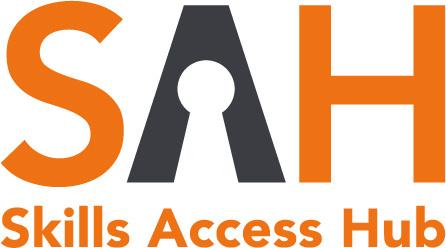
Members of the AGCAS Employer Engagement Task Group reflect on how the needs of employers and models of employer engagement shifted in response to the Covid 19 pandemic. Here, they outline how the AGCAS community has come together to support all stakeholders to navigate a post pandemic world.
The AGCAS Employer Engagement Task Group aims to be agile and responsive to the needs of the community. This was none more apparent than during the Covid 19 pandemic. The group observed and monitored how key stakeholders were reacting and the key hot topics arising, regularly meeting to facilitate the sharing of intelligence garnered amongst the wider community.
A key topic of discussion in recent months has focused on how university collaborations have become increasingly popular with both employers and universities. For many employers, particularly those with smaller graduate recruitment teams (who are also more likely to have been negatively impacted by the pandemic through loss of resource and budget), the ability to tap into a wider pool of student and graduate talent from multiple universities in one interaction is an attractive prospect. With return on investment increasingly important, not only are employers able to engage with higher numbers of students but potentially more diverse student cohorts.
There are also clear benefits to universities. By working as part of a group of institutions, it is easier to attract a greater diversity and volume of employers This in turn promotes equity as students from each institution can gain access to opportunities that they might not have had access to before In addition, with attendance at employer events remaining inconsistent across the sector, the pull of big employer brands is likely to increase the number and quality of interactions with students
Seven London based universities with large widening participation student populations (Kingston, Westminster, London Metropolitan, Greenwich, Hertfordshire, West London and Roehampton) are part of the Inclusive Futures Group Collectively, the group aims to increase access to opportunities for students and graduates by hosting a joint virtual careers fair Now in its fourth year, the fair has grown in popularity attracting over 120 employers this year and with a 400% increase in student engagement over the last three years
The five London based Russell Group universities have come together to deliver the Shanghai Online Fair, led by Imperial College London, to collectively support their combined Chinese national population of over 18,000 students In addition, the group has delivered a series of events as part of Spotlight on Inclusion focusing on the lived experiences of their alumni and ensuring students feel a sense of belonging to different sectors and job roles before making applications to diversity initiatives
The Scottish Graduate Jobs Fair brings together all 15 Scottish universities giving employers access to over 15,000 graduates in a geographically neutral online space Originating from the University of Edinburgh Summer Graduate Recruitment Fair, the pandemic and the shift to virtual delivery created space to innovate and deliver a truly collaborative event for all graduating students in Scotland With employer and student needs at its heart, AGCAS colleagues across Scottish HEIs have built a strong basis for a continuing partnership In 2022, this event had 95 organisations, 4,777 student registrations, and 2,960 unique student logins a 62% conversion, and a 75% increase on the two previous years A partnership with
The group observed and monitored how key stakeholders were reacting and the key hot topics arising, regularly meeting to facilitate the sharing of intelligence garnered amongst the wider community
GTI lightened workloads for staff; employers appreciated the high attendance and the variety of graduates they wouldn’t necessarily meet at an in person fair; and 91% of students said they would recommend this event to a friend, making a compelling case for this to become an annual event

The Higher Level Skills Match project was started in 2017 by Birmingham City University, Aston University and Newman University to present a unified approach to business engagement and provide SMEs with access to student and graduate talent through a single point of contact This joined up approach was further enhanced in 2020 with Lichfield District Council and Tamworth Borough Council joining the partnership The project has engaged 567 SMEs with multiple success stories including the hiring of graduate talent into the local economy
Collaborations work on a micro level too and are more manageable for smaller employers who may not be able to support larger engagement activities but are still eager to benefit from a wider pool of potential talent. Kingston and Queen Mary are working with a tech company who is benefiting from increased brand awareness and the opportunity to develop students’ sector specific skills and identify talent across both institutions.
As the world of employer engagement continues to change and with models of employer engagement constantly evolving, it is essential for the community to keep up to date with industry trends and new innovations The AGCAS Employer Engagement Task Group has developed and delivered a range of relevant and engaging training sessions, providing opportunities for those working in employer engagement to develop professionally and respond effectively to challenges and shifting priorities
We shared collective knowledge, experiences and best practice at an Employer Engagement Forum in January 2021. The was an opportunity for the employer engagement community to come together to discuss the challenges and opportunities brought about by changes in response to the pandemic, and to support each other in navigating uncertain times and identifying solutions.
Hot topics included managing stakeholder expectations, positioning our expertise to employers to demonstrate our key role in facilitating graduate recruitment, and navigating hybrid delivery models. Attendees had the opportunity to reflect on the pace of change and decision making processes facing employer engagement professionals, and consider the changing skillset required for post pandemic delivery models.
We drew on the issues and hot topics surfaced at the forum to develop a suite of training aimed at upskilling employer engagement professionals Based on the positive feedback received, we are committed to delivering the training again with existing sessions adapted to fit a post pandemic world, taking feedback into account to ensure they are fit for purpose We also plan to run shorter bite sized modules, with new sessions focusing on SMEs, international students (working with the AGCAS Internationalisation Task Group) and placements
We encourage employer engagement professionals to think creatively when it comes to working with employers and to embrace positive changes in the industry The Employer Engagement Task Group will continue to support the AGCAS community to navigate the changing landscape of employer engagement as we move into the post pandemic era
With models of employer engagement constantly evolving, it is essential for the community to keep up to date with industry trends and new innovations
Lucy Everett, University of Edinburgh (Co Chair)
Andrew Wright, King’s College London (Co-Chair)
Paul Clatworthy, Queen Mary University of London
Olivia Trodden, Kingston University
Matthew Howard, University of Leeds
Maria Dobrzanska, Leeds Beckett University
Gillian O’Brien, University of Liverpool
David Bond, Birmingham City University

Intended to give attendees an understanding of how to approach employer engagement within their specific institutional environment, and equip employer engagement professionals with the introductory tools, skills and confidence to provide a needs-based approach to deliver impactful employer engagement
Intended to equip participants to develop, enhance, deliver and review data driven employer relationships and business development, effective in their own context and mapped to stakeholder need Aimed at those who would like to develop their skills in relation to employer engagement in the curriculum
Creating and Implementing Online, Careers related Employer Engagement Activities
Intended to build confidence and encourage innovation in hosting online employer engagement activities
partially due to the continuation of the increased use of digital approaches to engagement, so too do measures of impact This presents an opportunity for industry and universities to develop their measures of engagement, considering the priorities of the university, employers and students regarding “successful” engagement
In September 2022, AGCAS published a research report in collaboration with GTI on industry educator collaborations As part of this research, we produced a framework to capture the interactions taking place between universities and industry The framework was created through the review of previous research reports, including the 2021 AGCAS report on employer engagement, and through discussions and feedback collected throughout the project We also conducted short interviews with individuals from industry that collaborate with universities, as well as interviews and focus groups with HE educators to explore the opportunities and challenges of industry university collaborations
One challenge which the research highlighted is the difficulty of measuring the impact of collaborations between universities and industry A lack of measures for both universities and industry could potentially limit opportunities for collaboration and interaction if there is a lack of visible outcomes/achievements
The focus groups also highlighted the challenge of demand vs resources Careers and employability professionals discussed the volume of work required to develop and maintain interactions, particularly in the context of hybrid working/delivery Staff turnover was cited as a resourcing challenge, particularly the maintaining of a relationship with an external partner if an individual leaves Related to this, industry representatives noted the difficulty of knowing how/where to engage with universities Participants noted a lack of consistency in ways to engage with universities and a lack of clear points of contact to approach when seeking to engage
Finally, careers and employability professionals cited challenges in keeping CRM systems up to date and ensuring a consistent approach to the use of systems across their institution.
Despite the challenges associated with measuring the impact of industry engagement, some participants suggested that this provides an opportunity for both industry and careers and employability professionals to develop more nuanced and subtle measures of engagement As interactions develop and expand,
Another key area of opportunity identified is the development of more embedded interactions This means interactions that take place within teaching and learning and across the student experience Careers and employability professionals noted that embedded employer engagement ought to be led by careers and employability teams, with support from academics Relating to this, creating institutional wide approaches to industry engagement could strengthen connections and a deeper understanding across institutions and industry about the ways industry can engage with universities. Developing institutional approaches to industry engagement could support the joining up of activity taking place across a university, making connections between different types of interactions and making it easier for industry to know how to engage.
Finally, despite the challenges presented by CRM systems, participants suggested that they have the potential to create connections to streamline interactions across an institution. A university wide, centralised CRM could support the streamlining of industry interaction processes, connecting the dots between the different activities taking place across a university
Fostering further connections and collaborations between industry and HE is beneficial to all Industry has a key role to play in student skill development, the creation of work experience opportunities and the development of research and knowledge, whilst highlighting their own brands and attracting students and graduates to roles within their organisations
The interactions framework, we hope, will continue to evolve with AGCAS member input to provide insights into the extent of industry engagement activities being undertaken in universities at a macro and micro level, including new and emerging forms of engagement The framework can be used as a tool to communicate internally when discussing different industry engagement activities taking place across universities and to create roadmaps
Joining up conversations and activity is key to establishing, developing and maintaining positive interactions between industry and HE The framework and challenges and opportunities identified by this research can enable employer engagement professionals to lead the discussions within their institutions, driving forward a centralised, institutional approach to industry engagement, with careers and employability services at the core
florence.reedy@agcas.org.uk
Connect with Florence on LinkedIn
Connect with Florence on Twitter

FLORENCE REEDY, AGCAS Policy and Research Manager, outlines the opportunities and challenges of industry and university interactions


ADAM HUG gagement Manager and
CERYSJONES, Employer Partnerships Manager, at Manchester Metropolitan University outline how the Employer Partnerships Team have worked with SMEs as part of the place based graduate employment agenda
Digital is one of the fastest growing sectors in Greater Manchester, leading to strong demand for tech and creative digital skills. A large proportion of the student population at Manchester Metropolitan University resides locally which, according to research from Office for Students (OfS) impacts their job prospects; evidence suggests that students who move away from home to study or work are more likely to find highly skilled employment compared to those who stay in their region The Graduates for a Greater Manchester Project (G4GM), funded by the OfS, aimed to help local graduates from disadvantaged backgrounds develop and use digital skills in industry, not only addressing the skills gap, but also boosting confidence While G4GM was a joint project between Manchester Metropolitan University and the University of Manchester, this article will focus on the Manchester Metropolitan University delivery

In 2019 20 G4GM set out to co create small scale, high impact, interventions with local organisations, contributing to the university’s co curricular “Third Term” programme. These interventions, to support digital skills, were designed to be in person with a mixture of off site and campus activity delivered by our employer partners.
The pandemic caused widespread disruption to the planned activity with both G4GM and the wider Third Term programme. We moved swiftly to ensure continuity with the project, transitioning to online learning designed to engage with large volumes of students, which proved to be an innovative approach that paved the way for the Third Term programme to evolve into what is now referred to as the Rise programme. The Rise programme has since gone from strength to strength, winning a Guardian award, and now includes a wide range of learning material alongside a year round calendar of events.
The co production of resources with our partners allowed a rapid transition, once it became clear that in person activity wouldn’t be possible Working collaboratively was key to our success and once we had re designed our activity at the start of May, the university’s central communications team kept students engaged during the lockdown period
This allowed G4GM to engage with 634 students and deliver 6,696 hours skills training by the end of the first academic year Despite the level of disruption, this engagement surpassed our original year one target of 100 students and 2,000 hours of skills
The online learning courses were launched to the entire student population focused on Coding, Digital Communication, and Design Thinking led by interdisciplinary colleagues and external practitioners. Students completed a toolkit of their choice designed to upskill in AR/AV, Podcasting, Social Media, and Physical
training
We recognise the impact our university has in Manchester and value our employer partnerships in the region
Computing skills The toolkits were created by partners in industry and included a challenge that students were asked to address Over the three years of the project, this content was expanded to cover further areas in tech and creative digital allowing 22,800 hours of skills development to be delivered
Whilst we were able to switch most of the content online, some activities weren’t feasible without elements of face to face delivery As lockdown restrictions eased, we were able to offer a hybrid approach with a return to in person activity and online sessions A range of bootcamp style sessions were delivered in partnership with local social enterprise SharpFutures, giving students hands on experience in a range of areas such as Digital Photography, UX, and Creative Digital The additional launch of our Rise Internship programme with roles across the sector allowed 35,583 hours of placement and project experience to be delivered as part of the project after the pandemic disruption restricted year one to 2,516 hours
Throughout the project, we worked in collaboration with a steering group of four regionally based employer partners from across the digital sector, as well as Manchester City Council, Greater Manchester Combined Authority and Manchester Digital, a trade body representing hundreds of local digital employers The steering group was a soundboard for ideas and provided recommendations and advice for the direction of the project This allowed us to shape our activity to link with industry developments and meet industry needs
Due to the success of the project, we recruited a Curricular Engagement Manager to continue engaging employers with the Rise Programme Based on positive feedback from both students and employers, we will continue to adopt the pathway approach offering a range of co curricular activities from courses to bootcamps and accreditations to prepare our students from non aligned degrees to enter the digital sector As a Careers & Employability Service, we can be more agile with employers seeking to engage with our students through this blend of activity
To continue catering to the entire student body across all degree disciplines, we partnered with Prodigy Learning to deliver online courses with exams in Microsoft Office and the Adobe Creative Suite in line with employer demand for these skills So far 50 students have completed these with a further 500 anticipated by December 2022 as we upscale the offer
This range of activities engaged with 57 local organisations to support students as newcomers to digital through to advanced skill development, supplemented with work experience placing them in a strong position to apply for graduate jobs A fashion student attended the Video Editing Bootcamp, subsequently securing an internship with a local employer This went so well that they were offered a graduate job as Digital Marketing Manager, highlighting the benefits for both students and employers We also worked with the University of Manchester, who used a targeted intervention with their undergraduate Psychology cohort to encourage them to develop digital skills and pursue careers in the sector
We recognise the impact our university has in Manchester and value our employer partnerships in the region Digital is now a key pillar in the University Education Strategy, highlighting the importance the institution is placing on digital skills and producing a talent pipeline for the digital sector in Greater Manchester and improving the confidence of students who need it the most a.hugill@mmu.ac.uk

We shaped our activity to link with industry developments and meet industry needs


RÍONNAGH SHERIDAN, Partnership Development Officer at Trinity College Dublin looks at how adapting to the twin challenges of Brexit and Covid-19 has changed employer engagement in Ireland and how the university sector has come together to move forward as a community
Two good things have come out of recent, challenging years: our improved capacity for collaboration and the community feeling that all problems are shared problems Careers services throughout Ireland have relied on professional networks (AGCAS, AHECS) to see us through Brexit and the pandemic, which have fundamentally altered the world of work for our students and graduates
These disruptors arrived at almost the same time As Brexit formally took effect in January 2020, news broke about the rise of Covid in Asia By mid March, we were in lockdown In Trinity College, I had been holding meetings with employers relocating from the UK or those planning to expand their EMEA hubs in Ireland, supplying them with information on the Irish graduate labour market and helping to define their employer value proposition (EVP) Suddenly, the information I had given them about growing their on campus presence was out of date
While our colleagues working in careers guidance adapted their one to one sessions with students to Teams or Zoom with relative ease, the way forward was less clear for those of us planning online careers fairs, skills workshops, and other employer student interactions. Could we create worthwhile interactions with employers with meaningful outcomes for students? Would a world of engagement beyond our shores open up, attracting overseas employers virtually?
Curious about how others were setting aside conventional ideas and reaching for the new, I contacted a colleague at Dublin City University Over the course of summer 2020, we shared informal conversations about our work, the discussions we were having with employers, and nuggets of industry knowledge that helped us better understand the context we were working in We spoke, too, about the practical stuff, particularly the technical challenges of acquiring and implementing virtual careers fair software
Our weekly meetings were paused as the first semester of online careers events arrived, but by the time we reconvened a few short
months later, we had even more to share Very quickly, we realized that we were building a body of knowledge, not just about how to cope with the digital turn, the pandemic and the Brexit influx of new employers, but something more tangible and collaborative about the fundamentals of employer engagement and our distinct institutional approaches
The benefits of crossing our organizational boundaries and sharing knowledge were self evident, and we needed to build on them We reached out to the Employer Engagement Manager at University College Dublin and invited her to join our group Again, we met weekly, holding wide ranging conversations without a set agenda Eventually, we floated the possibility of formalizing our practice, and inviting more members to join us
We were building a body of knowledge about the fundamentals of employer engagement and our distinct institutional approaches
Around the same time, AHECS was inviting expressions of interest to form Communities of Practice AHECS sees Communities of Practice as the ‘ideal mechanism to facilitate member engagement around shared challenges, problems, innovations and ideas’ We were already doing that, so incorporating our activities in a more formal way seemed appropriate In April 2021 we submitted our expression of interest to the Executive Board
The request was approved at a Board meeting, and we introduced the Community to AHECS members at an online meeting Several new members then joined the AHECS Community of Practice for Employer Engagement What struck us most, after a brief round of introductions in our first meeting, was that few of us were working in dedicated employer engagement roles, a fact that reflects core underfunding of Irish universities Many people in the group had two or three roles as careers consultants, administrators, events and social media managers, as well as employer engagement This is particularly true of those working in smaller institutions outside of the main Irish cities
In September 2022, Enterprise Ireland (EI), the semi state body responsible for growing Irish business, came together with the Irish Universities Association to produce an in person event for EI’s SME clients The event included a showcase of services available to employers through university careers services and screenings of pre filmed student testimonials, followed by a networking event to get employers and universities talking This was a one off event, but it could act as a blueprint for future events The newly incorporated Universities of Technology (formerly Institutes of Technology), which are making such valuable contributions in their regions, should also be a part of the conversation
Since the work of any collaborative group is defined by its membership, we decided that easing workload, providing easy access to labour market knowledge and interfacing with employers would be the core function of the Community Our work has yet to be fully mapped out, but scheduled meetings are in the diary, and a Trello board has been started for members to share and collaborate on ideas
Our first act was to invite in key employers to speak with us about their recruitment plans for the following year, which we did over a series of meetings in summer 2021 This is a flexible programme that could easily be expanded, organised by industry or with a regional focus, or used by us to interface with government or state agencies
We need many and more of these types of initiatives: a robust programme of activities for universities to interface with industry on a national level, spotlighting of industry clusters dominant in the regions, and pathways to collaboration between both We need knowledge sharing and exchange of expertise, community developed toolkits, and resources If we get it right, we will fundamentally strengthen our universities, our economies, and our graduates In a period of such opportunity, it is time to have conversations that spark real advancement and enrich all the already excellent work that we do, for the long term

Two good things have come out of recent, challenging years: our improved capacity for collaboration and the community feeling that all problems are shared problems
With Equality, Diversity & Inclusion (EDI) now a major focus for so many businesses there is a huge opportunity to harness this interest to support underrepresented students & graduates, whilst helping employers address their strategic objectives
SAMANTHA MORLEY, Employer Engagement Coordinator at Nottingham Trent University, outlines how their careers service has developed to support employers in adopting more inclusive recruitment practices and engage with underrepresented groups

The importance of a diverse and inclusive workforce has long been acknowledged in both the commercial world and higher education alike However, we have seen a distinct increase in the number of employers we work with who have specific targets to diversify their early careers cohorts We were keen to develop our service to respond to these needs and support employers in achieving these objectives, whilst ensuring student benefit remains at the core of all activity
NTU prides itself on social mobility, diversity and inclusion; actively recruiting students from underrepresented backgrounds and investing in their career development Around 50% of our students each year meet one of our ‘Rise’ (Widening Participation) eligibility criteria and we have an Employability Social Mobility Team specifically supporting these students
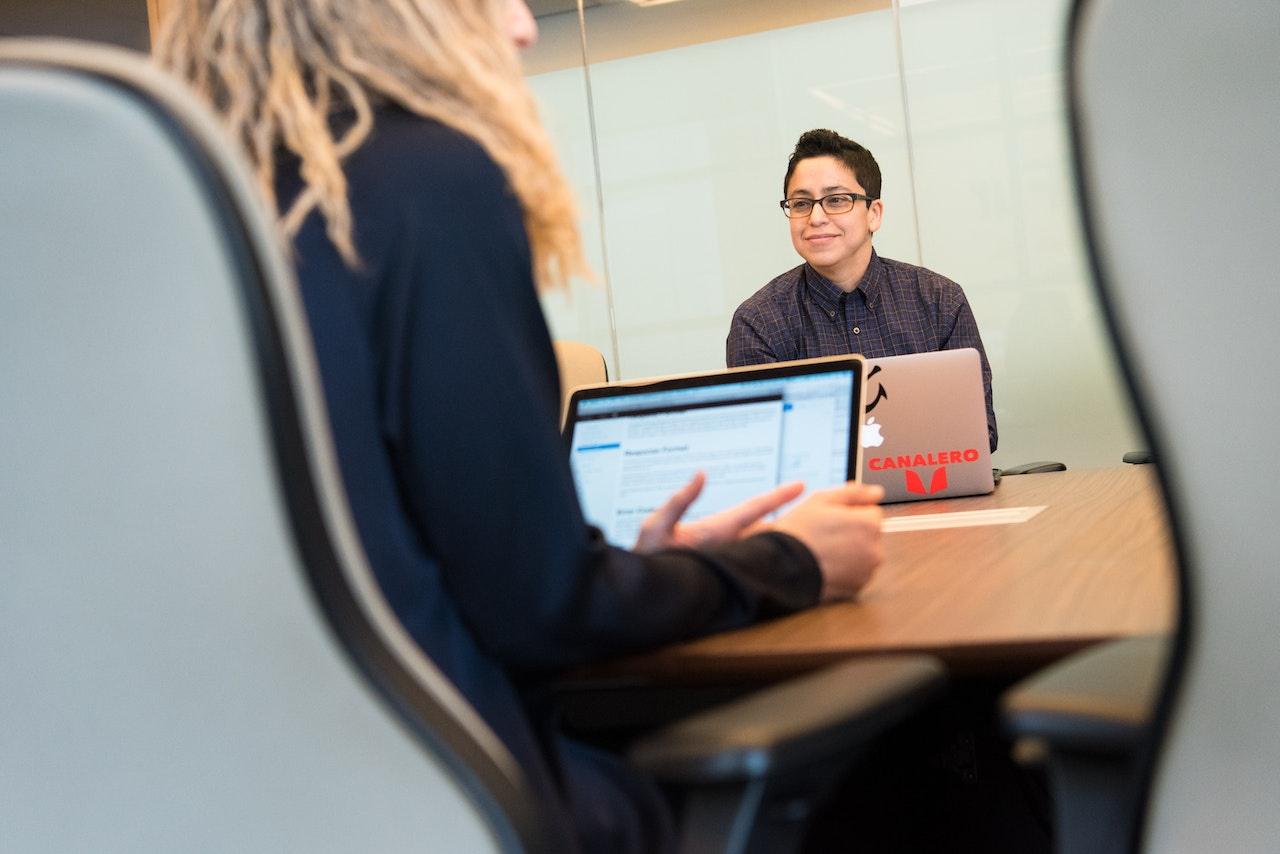
As part of our commitment to the EDI agenda, my role has a specific focus on social mobility, diversity and inclusion activity with employers, sitting across both the Employer Engagement Team and Student Development’s Social Mobility Team
This involves identifying employers passionate about diversity and inclusion, engaging these employers with relevant initiatives, and training the wider employer engagement team to champion inclusive recruitment practices with their key employers. Simply having the confidence to ask an employer if they have considered removing or reducing entry requirements or using a gender decoder to assess the neutrality of language in a job advert can make a massive impact on the accessibility of the role to a student.
We use a CRM system to log all external engagement and interactions with employers, and we have built in functionalities enabling us to track the diversity priorities of employers we are working with. These developments allow for staff across the employer engagement team to flag which strands of diversity employers are focusing on i.e. gender, social mobility, disability or ethnicity. We are then able to analyse this data through dashboards to identify trends across various industries and use this information to target organisations for EDI focused initiatives.
These initiatives aim to support the commercial awareness and confidence of students, whilst allowing employers to raise their profile with students and build a future pipeline of diverse talent
We also run a range of initiatives to support students from diverse backgrounds in their career development, and have embedded employers throughout, providing a platform for organisations to connect with their target groups through meaningful interventions

Our Rise PLAN Programme supports second year widening participation (WP) students seeking sandwich placements the biggest leveller for graduate outcomes of disadvantaged students. A session within this scheme is dedicated to inclusive employers, giving them a spotlight to showcase their opportunities, and give students tips on applications and selection processes. Last year we also launched a pilot Rise Insight scheme in partnership with local employers. This provided first year WP students from low performing graduate outcomes (GOS) cohorts with insight days at employers across a range of industries they wouldn’t have previously considered. These initiatives aim to support the commercial awareness and confidence of students, whilst allowing employers to raise their profile with students and build a future pipeline of diverse talent
Disability inclusion is a vital piece of the EDI puzzle Despite employers’ efforts to make reasonable adjustments, disabled graduates face severe employment disparity To support employers with this complex topic, we ran a disability inclusion conference in partnership with EmployAbility, connecting students with disabilities and neurodiverse conditions to inclusive employers Employers received a workshop with EmployAbility on how to make their recruitment more accessible, as well as the opportunity to speak directly to students through roundtable discussions We have also seen huge success in putting students and employers on equal footing as event delegates, allowing students the opportunity to share their opinions with employers, increasing their confidence and professionalism
Whilst inclusive recruitment is not a new item on the big business agenda, SMEs often lack the time, money, or expertise to implement these processes In response to this need we have developed a short course for SMEs through the ESF Reskill & Recover Project, supporting employers in their attraction, selection and retention of early career talent. Topics include understanding barriers for underrepresented groups, writing inclusive job adverts, how to alleviate the impact of implicit bias, and consideration of new approaches to selection such as strengths based, blind and contextual recruitment methods. As well as serving as a platform to influence employers to adopt more accessible practices, the course allows us to engage with businesses on a deeper level, understanding their priorities and challenges in relation to early career EDI strategies.
The diversity of our student population puts us in a strong position to respond to the growing focus on EDI across all industries However there have been challenges around alignment of employer interest areas and our main priority groups in relation to graduate outcomes For obvious and justified reasons, we ’ ve found many employer led schemes have addressed racial inequality and ethnic diversity, and whilst this is something we are passionate about at NTU, from an employability perspective we know other characteristics such as socio economic background and disability have a very clear employment disparity. A lot of work has been done around influencing employers to think more broadly about their target groups and consider changes they could make to their recruitment to be more inclusive of students from these disadvantaged backgrounds as well as more traditional focus areas.
Work in the EDI arena will never be complete. The uncertain economic climate and unpredictable pattern of student behaviour mean we will continue to look for new and creative ways to collaborate with employers around social mobility, diversity and inclusion Our offer to employers will continue to evolve in relation to the changing needs of industry, ensuring any activity ultimately supports the employability outcomes of our students
Samantha.morley@ntu.ac.uk
Connect with Samantha on LinkedIn
Disability
is a vital piece of the
DR NICOLA THOMAS, Head of Research at the Institute of Student Employers, shares findings from the Student Recruitment Survey 2022 and maps out how the current state of play is changing how employers engage with career services. In contrast to pre pandemic times, generally employers are moving towards a mostly hybrid approach, with only 3% of employers planning on going back to only face to face engagement with universities.
The Institute of Student Employers Student Recruitment Survey 2022 ran during August and September 2022 and received 168 responses from large student employers, covering 32,110 hires These hires can be categorised as graduates, school and college leavers, interns or placement students

In the survey, we asked organisations if they are pivoting to run continuous recruitment campaigns throughout the year or staying with standard campaign timings We found that the competition for early career hires is increasing and as a result, organisations are moving away from formal early career schemes and starting to recruit their talent across the year 38% of respondents said that they ran continuous recruitment campaigns This is a marked increase on previous years
When asked why employers are moving to ongoing recruitment campaigns for graduates, employers told us that they “need to stay open for hard to fill roles” and that they pivoted to more agile campaigns “to secure talent as early as possible” One respondent also said “this year, we saw candidates applying right up to the application deadline for some of our harder to fill vacancies We also saw late in season target uplifts from some areas of the business, which resulted in all year round recruitment and campaigns”

This has a knock on impact for how employers engage with careers services As focus shifts to rolling recruitment, the timing of careers fairs and formal graduate schemes becomes less important Employers have told us that they are starting to focus on a more targeted and relational approach to engaging with universities throughout the year
This year we asked employers what their future plans are with regard to engaging with universities in an online environment Increasingly across all activities, employers expect to do most of their attracting of early talent through a combination of face to face and virtual events
Considering insight and open days, most employers will run these both face to face and virtual, with a further 15% of employers running these virtually only A minority of employers (9%) will run these open days face to face only About a fifth of respondents (19%) do not run these days at all
Interestingly, a significant majority (65%) of employers do not plan on contributing to curriculum at universities as an attraction strategy, with 23% of employers planning on undertaking this activity this year both face to face and virtually A small number (8%) will contribute to the curriculum totally virtually, while even fewer employers (5%) will contribute in person only
The ways in which employers are engaging with careers services are in flux, but a clear trend towards hybrid engagement has emerged
Much attention has been paid to what the future of career fairs will look like A sizeable majority (69%) of employers plan on attending career fairs both in person and virtually 18% of employers will only attend career fairs online, with only 3% of employers just attending career fairs in person this year Overall, 11% of respondents will not attend a careers fair at all This marks
a change for career fairs, with the vast majority of employers planning to attend in either a hybrid or fully virtual capacity
Finally, no employers are planning on only giving talks and workshops in person, with a large majority (82%) planning on giving talks and workshops both face to face and online
14% of employers will give talks and workshops only online, with only 4% of employers not giving any talks or workshops
We asked employers why they were taking a more face-to-face, hybrid or online approach this year. Three core themes emerged:
Hybrid enables better use of organisational resources

Employers said they saved “resources and volunteers’ time”, “with our resource spread across Europe, Middle East and Africa, it's easier and cheaper to manage these events virtually”, it “provides greater reach, increases accessibility and helps with a small recruiting team”, and it “allows more flexibility and options for people to attend”.
Face-to-face leads to better engagement & is in demand from students
Employers said that “face to face is way more effective”, “students benefit from meeting employers face-to-face”, “we are meeting the demand for face-to-face from students”, “nothing beats in-person interaction”, and that “we have started doing face-to-face again to be competitive”.
Hybrid enables wider attraction and more targeted attraction
Employers said that retaining virtual reach has “enabled us to be able to reach the most amount of candidates/potential applicants”, “hybrid allows us to be more agile and reach more people”, “a blended approach means we're able to have a broader reach, target diversity more accurately”, “we decided to continue with an online approach this year given how we were reaching a wider audience via this means” and that they are “trying to capitalise on the extra reach and accessibility that virtual can bring to events”.
Covid 19 was a key disruptor in shaping how employers are engaging with universities Yet now employers have had the time to consolidate learning throughout the post pandemic era, they are assessing what works best and what delivers the most return on investment
What we do know is that now more than ever the ways in which employers are engaging with careers services are in flux, but a clear trend towards hybrid engagement has emerged
Nicola@ise.org.uk
Connect with Nicola on LinkedIn
PAUL CLATWORTHY, Deputy Head of Careers at Queen Mary University London (QMUL), outlines how using an engagement framework can help organisations build awareness as an employer of choice, ensure they engage the right students at the right time, and develop sustainable long term relationships with universities.
Prior to joining Queen Mary University of London (QMUL), I was Employer Relationships Manager at Kingston University where I worked with Lewis Sawyer, Graduate Development Partner, to identify the ways in which we take employers on a journey through their interactions with us to help build brand recognition, provide insights into the industry in which they operate, and to recruit our students As we moved to a post pandemic new ‘normal’, and with student engagement being erratic, we were conscious that employers and students needed to get the most out of every in person or virtual interaction
The result of this work was the creation of a framework to ensure students are attending activities that they will benefit from most and that employers are getting a larger return on investment by seeing students at the appropriate stage of their career readiness I have adopted the framework at QMUL to ensure our employer interactions are targeted to the right cohorts who will make the most of the opportunities presented to them to engage with employers
The AIR model loosely aligns to the careers readiness journey as we can see from Careers Registration data: Awareness (Explore); Insight (Plan); Recruitment (Apply) Using the framework has resulted in a more personalised and tailored experience for both sides. It allows career services to send targeted communications to students and it helps students understand why certain activities are relevant to them, why they should attend and the benefits they will gain.
The framework is built around the AIR model
Awareness, Insight and Recruitment a three stage process that employers can build their university activities around
All employers, regardless of size and previous institutional engagement, need to carry out awareness sessions Not only do these increase brand recognition, they also humanize the employer helping to build trust in their brand and allowing students to see them as a potential employer of choice Posting opportunities on a university jobs portal, delivering employer presentations, and hosting information stands on campus are all effective ways for employers to build awareness.
Having built up awareness, employers then share insights into their industry or company with students planning their next steps. Skills workshops, employer talks, industry panels and on site insight days are typical activities that happen at this stage
This is the stage at which students should be engaging directly with employers, beginning to move through their recruitment processes and being invited to assessment centres or interviews This is the time for employers to work with us to develop applicants’ skills and seek to close any skills gap through the delivery of practice sessions such as mock assessment centres and interview workshops
Many employers don’t always recognise that, whilst there is general awareness of their brand, students will not always identify them as a potential employer Working within the AIR model has allowed us to make each interaction bespoke to each employer It has also helped us to build trust with employers and demonstrates good practice around account management leading to more sustainable partnerships in the long term
p.clatworthy@qmul.ac.uk
Connect with Paul on LinkedIn

Director of the White Rose Industrial Physics Academy (WRIPA), outlines
Connecting higher education providers with employers helps students to develop an expansive skill set and create experiences that prepare them for an ever evolving world Universities now face the challenge of supporting the career needs of students in a dynamic labour market where employer recruitment processes have changed, as well as the graduate attributes that employers value
The White Rose Industrial Physics Academy (WRIPA) is a collaboration between businesses and university physics departments in Hull, Leeds, Nottingham, Sheffield and York Our mission is to provide physics students with the opportunity to gain skills and work experience that better prepares them for graduate level work In recent years, WRIPA has adapted to the changing nature of employer engagement, pivoting to working more with alumni businesses and curriculum development, resulting in an improved employer engagement model
1.
Co-creation of digital career planning tools
Students are increasingly interested to hear about businesses beyond their corporate messages (e g the organisation’s ethics, work/life balance etc) The Physics Careers Case Studies Tool supports undergraduate physics students to make better informed career choices Based on physics alumni interviews, the tool enables users to access case studies based on search terms, including ‘experience type’ and ‘region of work’, as well as connecting with alumni via LinkedIn This new tool is part of our digital career resources, used in employability workshops and credited professional skills modules These tools were created in response to Covid to digitally connect our students to a broader range of (regional) employers
The University of Sheffield physics department have integrated skills training, embedding employers and work based learning across the physics degree from year 1 to year 4 These changes mean that all undergraduate physics students not only learn key graduate attributes (e g critical thinking, collaboration or resilience) but also reflect on how they fit into the world of work This is backed up by the opportunity to connect with local employers through compulsory modules Students can also gain work based learning through the physics year in industry programme or final year group industrial projects
The University of Leeds physics team have set up a new third year optional ‘Physics into Work’ module which provides students with workplace exposure and an opportunity to self evaluate the skills they learn, applying them to the real world Students complete 30 hours with a work experience placement, a reflective exercise and receive an employer evaluation In 2020/21, 11 students took this module Based on the micro placements, four students secured summer internships, two students secured part time work and three students secured graduate level work In 2022/23, 25 students are registered for the module.
Since 2014, the WRIPA fair has been a huge opportunity for businesses to engage with a larger and more diverse talent pool of regional physicists drawn from eleven university physics departments from across the midlands and the north.
During Covid, both the 2020 and 2021 fairs were virtual. Across both years employer engagement remained strong, but there was a significant drop in student attendance to two thirds of the pre pandemic level. We ascribed this to several factors, including “digital fatigue” and a perceived less exciting event. The 2022 fair has evolved to become a hybrid event consisting of ‘face to face’ (e.g. employer exhibitor stands) and virtual (e.g. sector specific panel discussions) elements.
A hybrid event enables us to address various business needs with big employers keen to retain digital engagement, while the lesser known (often local) employers prefer to meet students face to face Approximately 45% of employers at the 2022 fair were regional
4. Targeted initiatives to support students with a social communication / Autism Spectrum Disorder (ASD)
We know that not all students have the confidence to approach and work with employers, particularly those with social communication impairment WRIPA now collaborates with diversity friendly employers and supportive organisations, including Living Autism They support students to build up the confidence to apply for roles, and to disclose their disability
Embedding employers within the curriculum delivers an equitable approach to work opportunities, connecting with employers and gaining translational graduate attributes and skills
While it was a huge challenge, Covid gave WRIPA the opportunity to work with employers in different ways to support an equitable approach to skills development and better informed career choices Now, we can support employers and students better than ever before
andrew.hirst@york.ac.uk
Connect with Andrew on LinkedIn
Connect with Andrew on Twitter

ANDREW
how the pandemic altered their employer
As the world responded to the Black Lives Matter movement, diversity and inclusion became the top priority for many employers A spotlight had been shone on recruitment practices and the level of diversity amongst placement and graduate hires, and employers were having to find answers to some difficult questions
As a result, many employers started casting a wider net to attract more diverse students and engage with universities that traditionally wouldn’t have been on their target lists At Kingston University, we noticed a sharp increase in the number of employers that were reaching out to us where we’d never had any traction before

Manager from the Careers and Employability Service at Kingston University outlines how targeted employability programmes, such as their ELEVATE programme for students of Black Heritage, can support, attract and benefit both students and employers
Two years ago, Kingston University’s Careers and Employability Service launched ELEVATE an accelerator programme for students of Black Heritage in response to international momentum around Black Lives Matter
The Black Lives Matter movement and the passing of George Floyd in May 2020 further highlighted the issue of systemic racism towards people from Black Heritage backgrounds, including students The ELEVATE Programme was launched to address disparities in the degree awarding gap and graduate outcomes between Black and White students
ELEVATE is designed to support students to explore different career paths, build confidence and gain the right skills they need to prepare them for the competitive graduate recruitment market. Through the programme, students develop a greater awareness of careers across different sectors, enhance their employability skills and are provided with the opportunity to engage with a range of employers.
Entering its third year, and now a multi award winning programme, ELEVATE has supported over 700 students and has meaningful partnerships with over 30 employers such as Coca Cola, GSK and Marsh McLennan.
While it was positive that top employers were finally recognising the breadth and quality of talent available beyond their traditional target universities, we also found that there was a level of inconsistency when it came to their commitment to truly diversify their graduate intakes As a result, in order to partner with the ELEVATE programme, employers have to demonstrate their commitment by meeting certain criteria, such as using inclusive recruitment practices, offering employee affinity groups, and having strategic goals to improve the representation of employees of Black Heritage
Being able to offer partnership opportunities with ELEVATE as a targeted employability programme has resonated strongly with employers It has provided them with a framework and a platform to engage with some of our most underrepresented students Employer feedback has indicated that it can be overwhelming when looking to engage with new universities or knowing where to start when trying to attract diverse talent They appreciate that ELEVATE encourages targeted engagement activities and allows them to take tangible steps to improve their brand awareness as well as their attraction and recruitment processes
From the university perspective, having a strong addition to our employer offer has allowed us to work with employers in a more bespoke, targeted and consultative manner This has strengthened existing relationships and helped to develop new and exciting opportunities for our students
ELEVATE has supported over 700 students and has meaningful partnerships with over 30 employers
GSK were one of the original employer partners on ELEVATE. They provided exclusive opportunities for ELEVATE students to apply for their graduate programmes, and later hosted a hackathon and series of events in a Life Sciences module at Kingston.
“GSK’s participation in the ELEVATE programme is part of our wider commitment to diversity and inclusion that we know improves our business performance and gives us a greater opportunity to create better health outcomes for our patients. The programme enables us to engage driven and talented students from a range of backgrounds, as well as providing our employees with important development opportunities.”
Lucy Hegarty, Global Head of Early Talent Recruitment, GSKOver the last two years, Coca-Cola have run hackathons with ELEVATE students as a recruitment tool for their marketing internships. Both years they have offered positions to more students than they originally had advertised as they were so impressed by the quality of our students.
Through targeted promotion and attraction activities, five ELEVATE students took part in the Marsh Mclennan Legal Advance programme – a mentoring and internship programme.
The Air Charter Service were looking for a way to support local students. They offered a fully funded PhD scholarship, which was awarded to an ELEVATE student.
Avoiding a ‘student deficit’ lens, our approach with ELEVATE has focused on equity addressing the structural barriers that lead to unequal student outcomes rather than a need to ‘fix’ the individual student and practical steps that universities and employers can take to level up outcomes for marginalised groups

Through the demonstrated success of ELEVATE and the work that Kingston University is doing to embed personal and professional development in the curriculum, we were able to secure £1 7m of funding from the Mohn Westlake Foundation to create the Centre for Graduate Success which aims to put in place comprehensive support for specific student groups
ELEVATE has now become a blueprint at Kingston for targeted programmes which we are now developing for other underrepresented and marginalised groups such as students with disabilities and those from care experienced backgrounds Through these programmes we will continue to work directly with employers to address structural issues affecting employment prospects
o.trodden@kingston.ac.uk
Connect with Olivia on LinkedIn
SARAH PEEL, MSc Careers and External Engagement Advisor in the School of Management at University of Bath explains how mirroring the hybrid working style of professional practice enabled the MSc Careers team to successfully deliver their signature capstone project, Practice Track, at scale
Named University of the Year by The Times and The Sunday Times Good University Guide 2023, the University of Bath is recognized for its strong graduate outcomes Our focus on employability is embedded in our postgraduate curriculum, with opportunities such as the Practice Track: a practical alternative to a dissertation where student teams work on a consultancy project with a corporate partner, deliver a fundraising project for a local charity and produce an academic piece of writing
Pre Covid, Practice Track activities ran entirely in person and we documented in this publication how we pivoted to remote delivery when the pandemic hit in 2020 In 2021, due to the potential for last minute lockdowns, we decided to continue with remote delivery However, by the spring of 2022, Covid was no longer sufficient reason to avoid planning in person activities and we needed to think again
By February 2022, we had over 350 students signed up for Practice Track over 50% more than the last face to face programme in 2019 This growth represented a logistical challenge if we chose to return to 100% in person delivery, and yet we knew it would be difficult to justify remote activity to a cohort of students who had been repeatedly told about the benefits of engaging with their studies in person
We were therefore faced with a dilemma: how could we deliver Practice Track on such a large scale, in a way that was both manageable for our team, and would meet the expectations of our students and our external partners?
Our pandemic experience reassured us that both remote and in person interactions would be valuable for our students, so we decided to let our external partners take the lead in deciding which working style suited them best For many this meant adopting a flexible model:

“As a company, we appreciate the benefits of flexibility for our staff – be it a better balance, reduced travel cost or commuting time. Our staff and clients are scattered geographically across the UK, so we need to identify on a case-by-case basis what type of engagement is required for the project and the people involved. When we were invited to participate with Practice Track 2022, our instinct was to apply a hybrid approach of face-to-face sessions and video meetings”
 Lauren McKenzie, Mistral Data
Lauren McKenzie, Mistral Data
By using employer preference as the starting point for planning the company consulting project presentations, we ended up facilitating entirely remote meetings, hosting company representatives on campus, and transporting students to client site meetings
rtunate that we could accommodate the preferred e of all our external partners in 2022, but this was not hallenges: facilitating a bespoke experience for 53 omplex to manage The popularity of Practice Track gn of abating and numbers could be even higher in nticipate employers moving towards more in person and will therefore need to consider how we can deliver e We will also need to think about how to manage ectations if remote interactions become a minority We will therefore continue to monitor the evolving style potentially introduce parameters around the options r example limiting in person visits to specific and requesting campus visits or online meetings e restrictions
Our experience this year suggests that maintaining a blend of remote/in person delivery provides the best experience for both students and external partners Regardless of whether students met with their clients online or in person, over 60% cited client interaction as one of the key benefits of choosing Practice Track, noting “the chance to work in a professional setting” and “seeing the current business environment” as highlights of the programme
Similarly, our corporate partners preferred the hybrid approach:
Whilst we were confident that adopting a hybrid approach would work well for our corporate partners, we worried about how students might feel when comparing their experiences We therefore ensured our messaging highlighted the fact that the diversity of meeting formats reflected current working practice: all forms of interaction provided an opportunity to develop the skills needed to succeed in the modern professional landscape
We further ensured student satisfaction by providing plenty of opportunity for students to engage in face to face activities For example, we arranged a large scale launch event and delivered in person team building activities and training sessions We hosted hybrid meetings in our new School of Management building so that students could work together in a professional workspace, even if their client was only able to join online
Working with local charities gave students further opportunity to escape sitting at a desk all summer and apply their learning in a practical setting. During the pandemic many of our charity partners wanted to explore social media campaigns and online fundraising, but in 2022 we saw a return to a diverse range of physical events in the local community.
“From day one we wanted to make the students feel part of the organisation, therefore, regular meetings via Microsoft teams worked well and for key updates and presentations we met in-person. The pandemic showed us that remote working with academic institutions is more than
Few of us envisage a world where we return to the office 100% of the time so it seems the hybrid world is here to stay: embracing this flexibility can lead to a successful collaboration for all stakeholders.

just possible and in fact can thrive, with the students teaching us a thing or two about remote working.”
Maintaining a blend of remote/in-person delivery provides the best experience for both students and external partners
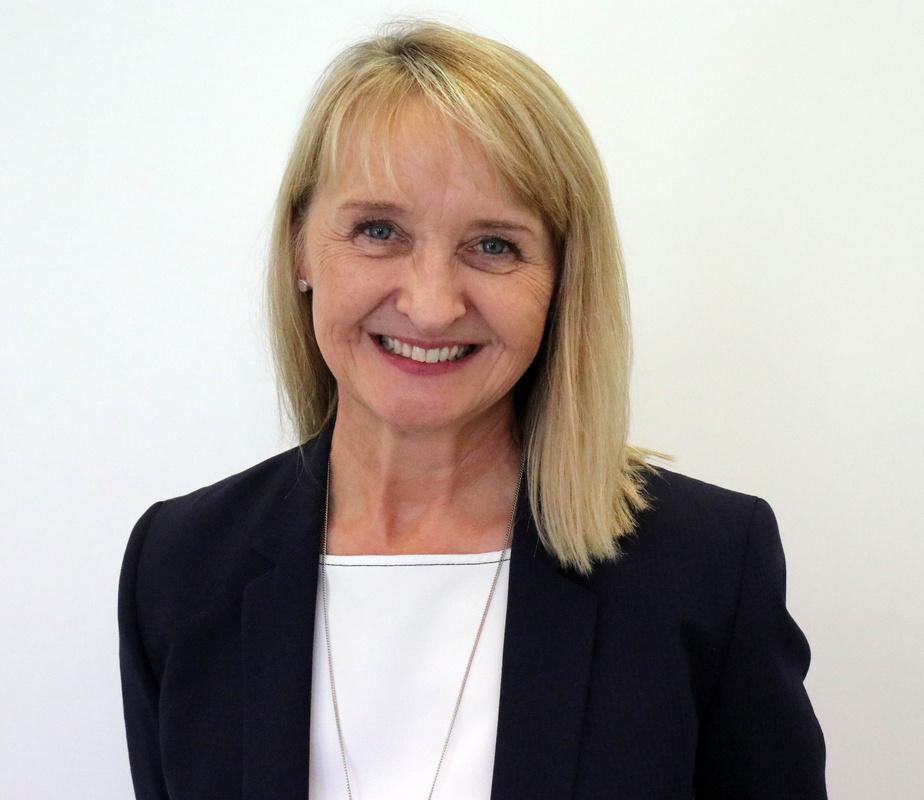

The AGCAS Work Experience Standard and Good Practice Guide aims to have a positive impact on students and graduates, employers, HEIs and the wider sector ELAINE BOYES, AGCAS Executive Director and HELEN SMITH, AGCAS Social Mobility Director and Head of Careers at the University of Sheffield, outline the development and the objectives of the Standard, and encourage members and employers to sign up
The issue of unpaid work experience and internships for students and graduates has been a matter of concern for the careers and employability sector for some time. To support and enable social mobility, it is imperative that access to placements and work based experiences is fair and equitable for all students and graduates, regardless of background. At the beginning of the pandemic, our concerns were that the subsequent economic downturn might result in a rise in unpaid opportunities being offered to students and graduates. It was time to work across the sector to prevent this happening. In August 2020, we called for volunteers to join a working group and were encouraged by the very positive response Consisting of individuals from AGCAS member institutions, employers, employer representative organisations and other sector bodies, the group met several times during 2020 and 2021 Members of the AGCAS Placement and Work Related Learning Task Group also made a particularly significant contribution to the work of the group

The group ’ s objectives included ensuring that work experience offered to students and graduates is of a high standard and is fair and accessible, regardless of a student’s personal characteristics or socio economic circumstances The group also wished to support employers to continue to create high quality, paid work experience opportunities for students and graduates, and to help employers access a larger pool of diverse talent Finally, the group wanted to create resources to help universities adopt a more consistent approach to the management of work experience opportunities, and to make it easier for employers to understand the expectations of universities when advertising placements and work experience opportunities
Standard is applicable to any work opportunity of 10 s/70 hours duration or more, which is employer led rather student/graduate led One of the key elements of the dard is that we expect that in scope work experiences of over hours should be paid Opportunities in scope must not be uired for statutory completion of a degree and must be primarily ed at student/graduate level Providers of shorter or other work erience opportunities that are not within the scope of the Work erience Standard are still encouraged to consider how the best ctice principles laid out in the Standard can be applied
have also introduced the Good Practice Guide for employers recruit students/graduates to work towards We do not expect y work experience opportunity to meet each criterion in order e advertised to students and graduates Instead, it is designed to act as a tool to help careers and employability professionals and employers to work together to make opportunities as attractive as possible to potential candidates and to raise the standard of work experience opportunities advertised to students/graduates across the sector The Guide is not exhaustive and universities are able to adapt the table to reflect good employer practice in their own institution
Our aim is for the Work Experience Standard to be widely endorsed and adopted across the sector and we ask member institutions and employers to join us in making work experience for students and graduates consistently fair and equitable. The Standard and the Good Practice Guide have already been endorsed by the ISE, Clifford Chance, RMP, NCUB, JISC and Group GTI.
To join the list of employers, sector bodies and organisations endorsing the Standard and Guide, sign up here.
We will be supporting AGCAS member services to adopt the Standard for use with employers, starting with a member webinar before the end of the autumn term We are looking to you for case studies of how the Standard has already been used to support discussions with employers offering work experience opportunities

The working group oversaw the development and launch of a new Work Experience Standard, setting out the preferred requirements for a work experience opportunity that universities expect to be met in order for an opportunity to be advertised to students The Standard helps universities to manage work experience vacancies more consistently, and helps employers to understand what to expect when advertising work experience opportunities with higher education institutions in the UK We anticipate that the Standard will enable universities to have more productive conversations with employers to ensure that the in scope work experience opportunities advertised to students meet sector standards
Throughout the year we will continue to promote the importance of the Work Experience Standard to employers, policy makers and the wider sector We hope you will all join us in endorsing and supporting the aims and adoption of this work to reduce incidences of unpaid and unfair work experiences We ask for your support
elaine.boyes@agcas.org.uk
helen.smith@sheffield.ac.uk
It is imperative that access to placements and work-based experiences is fair and equitable for all students and graduates, regardless of background

Fast forward a year, and the onset of the pandemic in 2020 meant that virtual fairs were a necessity Changes in employer recruiting policies also meant there was a greater desire for employers to meet students from underrepresented groups This highlighted the importance of the IFF for both employers and partner universities
KRISTINA KAND, Recruiter Engagement Officer at University of Westminster and JONATHAN EASTWOOD, Head of Careers and Volunteering at University of West London reflect on three years of the Inclusive Futures Virtual Careers Fair and introduce a new toolkit to support students As campus fairs return, they consider the continued value of virtual career fairs and how they can offer equality of opportunity for underrepresented student groups
University of Hertfordshire, Kingston University, University of Greenwich, London Metropolitan University, University of Roehampton, University of West London and University of Westminster
In 2019, the University of Westminster reached out to a small group of widening participation focused institutions to collaborate on a virtual fair The purpose of the Inclusive Futures Virtual Careers Fair (IFF) was not only to showcase our students as motivated, bright and work ready but also to provide an opportunity for students to engage as partners and co creators in the development of employers’ inclusive recruitment and development practices This helped students develop confidence and understand why a diverse workforce is key for any successful business
Since its launch, the IFF has proved to be highly beneficial for all stakeholders For partner universities, the event has attracted the interest of numerous employers who would not normally target all the collaborating institutions separately For students from underrepresented backgrounds, the IFF has enabled greater equality of opportunity to meet employers who they previously may not have met at their institution’s fair For employers, meeting diverse students from several institutions at once without having to leave the office means the IFF is considered an excellent use of time Above all, for firms that are socially responsible and embrace difference, the consortium of IFF universities showcase a diverse student community and provide a real momentum for change
Virtual careers fairs can give students from underrepresented backgrounds access to employers that they might not otherwise meet, however specific actions are required to help them make the most of these opportunities To truly deliver equality of opportunity, it quickly became clear that fairs could not be ‘dragged and dropped’ from campus to virtual
Virtual fairs are more solitary events that can be challenging for disabled students and those lacking confidence There is much more emphasis on employers to reach out to students After the first IFF, employer feedback expressed disappointment at students not turning their cameras on, stating that this contributed towards flat conversations Students from underrepresented groups are less likely to have private spaces at home, strong Wi Fi and suitable equipment To address this, in later iterations employers were briefed on potential situations and campus spaces were booked for students to use
Corporate messaging shared via employer booths can seem unrepresentative and off putting to students Students fed back that while the individuals they met were representative and inclusive, in some cases this contrasted with the corporate written materials

provided In recent iterations of the IFF we have guided employers to use more inclusive materials, contributing towards higher conversion Ark Teacher Training commented “Virtual events can be intimidating, and we have worked with the fair organisers to tailor our messaging and create multiple ways for students to interact with us ”
When participants were surveyed after the 2021 IFF, 96% of respondents had a positive experience at the fair, but less than half of those made applications to employers they met, with those that did making an average of 2 1 applications A high proportion of students were having a positive experience but not going on to submit applications
To support the 2022 IFF and for use across the sector, the seven participating universities have worked with the Quality Assurance Agency (QAA), and in collaboration with students and employers, to create a free Virtual Careers Fair Toolkit to help students from underrepresented groups make successful applications and grow their networks as a result of attending virtual fairs
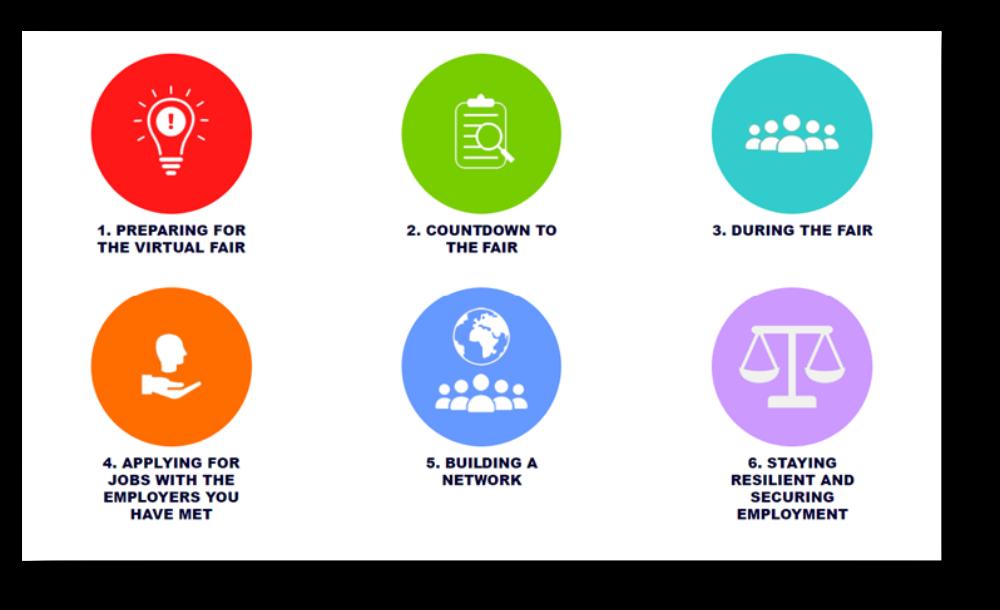

The toolkit guides students through preparing for a virtual fair, questions to ask and how to deal with difficult scenarios on the day The toolkit also covers converting conversations into applications, building a network and maintaining resilience
Rigorous impact measures designed to capture the numbers of successful applications and students’ post fair activities have been laid out over the next few months to test the impact of the toolkit
Virtual fairs are here to stay. One of the great triumphs of IFF is that it has made collaboration between partner institutions seamless; institutions should embrace this. There is a consensus that the lessons learnt via IFF have strengthened other aspects of all partner institutions’ offer
All employers contacted for our pre fair research noted that they had better conversations with students who had researched their organisation. The toolkit provides a research model that works for those who have lots of time to prepare, and also for time poor students who may have caring or work responsibilities alongside study. The preparation section gets students to think about their location and empowers them to turn the camera on.
The toolkit gives students a downloadable action planner which aims to help them get the right information from virtual fairs and turn it into successful applications Research into “net potism” over the last few years has demonstrated how recruiters have had to fall back on existing networks to find graduates The toolkit aims to help students add recruiters they meet to their network to allow the creation of other opportunities to support their job search
Other universities should be evaluating the outputs from virtual interventions and may consider using the toolkit or other methods to ensure that outcome gaps are not being widened The lessons around preparedness, confidence and resilience are not specific to virtual fairs and can also be supported during campus based activities Through effective evaluation and support, it is the responsibility of fair organisers to ensure that they that they are not widening outcomes gaps but are achieving their potential as instruments for social justice
equality
opportunity, it quickly became clear that
could not be ‘dragged and dropped’ from campus to virtual



3. Students were looking for a “bootcamp” to support their employability.
KAREN HALL, Assistant Director (Opportunities) and HEATHER GAUNT, Employability Experiences Manager at the University of St Andrews outline how Your Future, Start Now, an employability programme delivered to students in conjunction with employers and alumni, allowed them to scale their careers provision.
Your Future, Start Now is an employability programme that we piloted for first and second year students in spring 2022 We wanted to encourage our students to engage earlier with the Careers Centre, and this idea gained momentum when considering the challenges detailed by industry in the 2021 Chartered Management Institute (CMI) report Work Ready Graduates: Building employability skills for a hybrid world This information mirrored what was being shared through our AGCAS and ISE communities, as well as the insights we were gaining through conversations with alumni, employers and our students Three key findings from the report informed the Your Future, Start Now programme:
Only 22% of employers surveyed across the UK thought that graduates were equipped with the key employability skills they required Team working, critical thinking and problem solving, and communication were highlighted as key Employers want tools to help them assess a graduate’s employability The three most popular approaches are: An accredited training course or qualification Internships, placements or work based learning Completion of short, bitesize employability skills training programme
Industry had evidenced skills gaps, as detailed above, but we were seeing the employer engagement landscape change too through more multi institutional events. We found that some employers were creating their own platforms to deliver events and workshops to all universities simultaneously Whilst these were informative and wide reaching, it did mean our students lacked the same opportunity to reach out to these employers personally When designing the programme, we believed that alumni and employer input would ensure our students gained practical insights, experiences and support directly from organisations in order to bridge these gaps
The Your Future, Start Now programme filled within an hour of launch It consisted of five online workshops delivered in a supportive and structured environment by intrapreneurs in their fields, employees who channel the same creativity and innovation to develop new products and services as an entrepreneur might Organisations value intrapreneurial employees for their creative thinking, initiative and innovation skills that employers across all sectors desire
Workshop topics included professionalism, communication, teamwork, and creative problem solving and were delivered alongside our careers advisers to further enhance careers related learning Microsoft Teams was at the heart of the programme and was used to share all resources and communications, and to develop a sense of community
Alumni volunteers got involved in the workshops, sharing their workplace challenges and opportunities tied to the theme of each session Alumni involvement facilitated a productive connection to the world of work beyond university For our students, this took the fear out of exploring the next step of internships and we are keen to build on this mentoring capacity moving forward
A paid micro internship with a local employer was then offered after the workshops, which presented an opportunity for our students to develop professionally whilst also contributing positively to the wider St Andrews community.
programme was being able to recognise my own skillset”
Student participantThe profile of the Careers Centre has been raised for programme participants Many students joined the programme with little knowledge of or engagement with the Careers Centre (85% had not had a previous appointment and 50% had not engaged at all with the service) Students from the programme are now our biggest supporters within their peer groups Some of our participants have also benefitted from additional support from other student services through feeling comfortable enough to share their needs whilst on the programme
Feedback from surveys completed at the outset and end of the programme demonstrated that students felt more confident about applying for future internships after completing the programme (3.18/5 at the outset and 4.38/5 at the end). 100% of student participants would also recommend both the programme and their internship to other students.
The practical insights, support and skills shared from alumni and employers have allowed our students to capitalise on their internships with Your Future, Start Now. In a world that has been closed off during the pandemic, our students have been able to reconnect to St Andrews through their internships with local employers. Our students continue to evidence real impact with local SME communities and in the cost of living crisis have achieved longer term, paid opportunities on their own merit

Following student feedback, the programme now takes place in person, but we still use Microsoft Teams as the foundation to ensure inclusivity and to retain the key benefits of the platform We are looking at providing more recorded resources to support learning Students will be able to access these at any point which increases flexibility for employers and alumni who wish to take part We are keen to explore how we can support in person and online participants to benefit equally from the programme This is a work in progress
The delivery of the programme has evidenced the value of both alumni and employer support We are currently increasing the time in workshops for our students to explore skills more fully with our alumni, as well as reflecting on diversity and how we can support students to see themselves in those who have gone before The personal offer from our alumni has been as important as the career insights shared
“Between all the workshops and guest speakers, YFSN gave me the elements necessary for any career path. YFSN is great for developing leadership, teamwork, problem-solving, and many other sought-after skills, but I think one of the most important skills I gained from the
The delivery of the programme has evidenced the value of both alumni and employer support
ELLI WHITEFOOT, Assistant Careers, Employability and Enterprise Manager at Leeds Arts University, and member of the AGCAS Creative Industries Task Group, reflects on external engagement, within the creative industries and beyond, and shares how the careers service successfully used Knowledge Exchange funding to adapt their approach to employer engagement during and post pandemic.
As a specialist creative institution, we recognise the variety of career paths the creative economy offers, and the importance of engaging with industry to provide students with employment and opportunities to develop entrepreneurship Through our links with industry, we have long provided students with access to paid opportunities, assessed and course led projects, and industry insights including company tours, industry talks/panels and careers events All of our external engagement is intended to encourage students and graduates to foster connections, develop their portfolio, and build confidence and skills
Pre pandemic, the creative industries reportedly contributed £116bn in gross value added (GVA) in 2019, growing at twice the rate (between 2011 and 2019) of the UK economy as a whole During the pandemic, there was a drop in this contribution (£95bn in 2020), which was reflected in the level of engagement we saw from organisations and the variety of opportunities available to creative students and graduates This, paired with the isolation of studying under pandemic restrictions, led to a notable decline in student and graduate confidence, often displaying as a reluctance or nervousness to engage with employers and opportunities


To address this, we adapted our approach to external engagement to ensure our students could still access career defining opportunities, with added support and learning pathways to ease careers anxiety.
In November 2021, we were awarded Knowledge Exchange funding by UKRI for higher education institutions not in receipt of Higher Education Innovation Funding (HEIF) Over the course of the 2021/22 academic year, we used this funding to work with several organisations to address the issues posed by the pandemic, bridging the gap between them and students and recent graduates
The Creative Industries is renowned for being low paid if not unpaid and has been identified as one of the key reasons for the lack of diversity within the creative and cultural industries We have always discouraged unpaid opportunities and were reluctant to change this stance as a result of the pandemic We did, however, recognise that organisations were struggling financially during the pandemic, which was having an impact on the opportunities available for our students and graduates Through the Knowledge Exchange funding, we could ensure that students and graduates were paid for their work and recognised its value.
Working with organisations like Mindless Academy, we were able to provide training and internship opportunities to students and recent graduates. These allowed them to build on their digital storytelling, SEO and publishing skills, whilst also providing coaching around self awareness, resilience and professionalism,
We encouraged students to realise and value the transferability of their skills
We encouraged students to realise and value the transferability of their skills by providing other paid opportunities with organisations such as SAIL (Sustainable Arts in Leeds), allowing them to see how their development can lead to future roles and growth These included marketing internships, as well as a wide range of commissions and projects with their partner members Recognising that many of our students have an interest in sustainability, we have also organised discipline specific Carbon Literacy Training taster sessions, which provide industry insights into running a sustainable practice, with the option to undertake full, certified Carbon Literacy Training for those interested in exploring this further.
In addition to offering these opportunities outside of their studies, we have also worked with courses to facilitate professional engagement within courses, including live briefs, projects, and industry insights (talks, tours and portfolio reviews). By giving course leads the autonomy to shape Knowledge Exchange proposals specific to their cohorts, it has provided a much wider and more tailored pool of ideas to work from. The resulting buy in from courses also results, typically, in increased engagement from their students.
The most recent data from 2021 indicates that the creative industries’ contribution to the economy has climbed to £104bn in GVA, showing a positive trend in recovery Although this has resulted in an increase in creative opportunities across most areas, many entry level roles continue to be low paid with high expectations in terms of specific industry knowledge, application criteria and role requirements, more akin to those with years of experience in industry
It is important for higher education institutions and employers alike to recognise the impact of the pandemic on industry, particularly on those entering the job market As such, we will continue to work with employers to understand and improve their offer to graduates, in terms of reasonable job roles, expectations (at entry level), training and pay, encouraging change and development on both sides by offering advice and insight
We have integrated feedback and reflection into all Knowledge Exchange projects, so we can gather valuable data as we progress Overall, it has shown positive results from an employability and enterprise perspective:

Seeing the benefits and positive feedback from our first year of Knowledge Exchange, we aim to expand the offer over the next year, and beyond In addition to continued funding for training and work experience opportunities, we also aim to work with organisations to research the local creative economy and the long term impacts of the pandemic on graduate progression to proactively address skills and knowledge gaps
Connect with Elli on LinkedIn
“Often, internships nowadays can be quite competitive and inaccessible to many people. This is a frustrating barrier to employability. As a creative writing student who is working towards a freelance portfolio career, this internship is an exciting opportunity for me to gain experience and connections”
It is important for higher education institutions and employers alike to recognise the impact of the pandemic on industry, particularly on those entering the job market
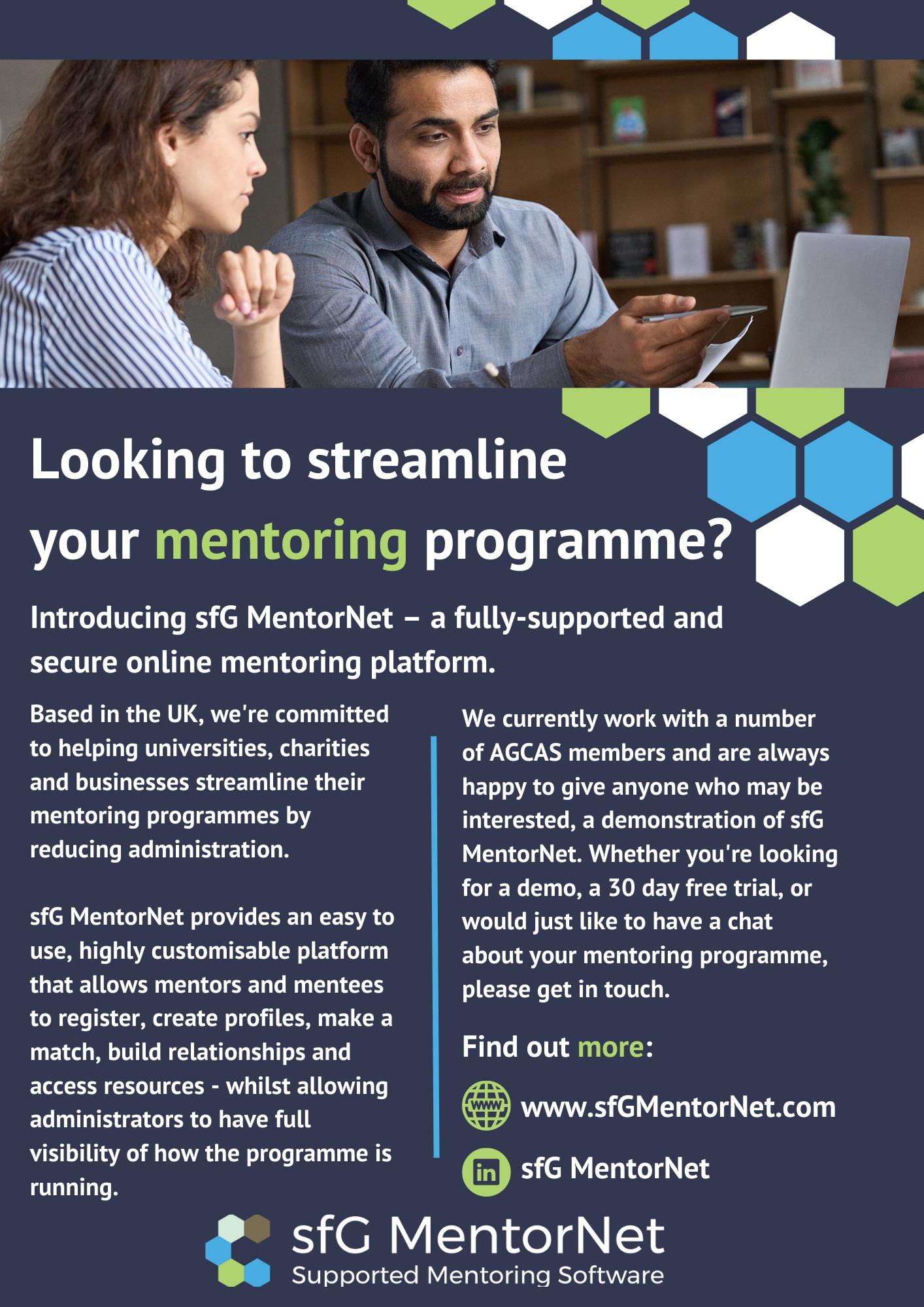


Almost a decade ago, sfG MentorNet was created to provide a secure, online mentoring platform which would have the ability to streamline the overall process between mentor, mentee and administrator.

Fast forward to 2022, we have customers joining us from all over the world, making now as good a time as any to shout about the benefits of using an online mentoring platform, like sfG MentorNet, to effectively manage your mentoring and coaching programmes.
Each organisation and workplace has its own challenges when running mentoring schemes, and one major benefit of using an online mentoring platform is the ‘all in one ’ functionality that can help target the common pain points we always hear about
By taking a mentoring programme and moving it to an online platform, administrators can say goodbye to the days of flicking between multiple spreadsheets or Word documents that contain user's information profiles, matchmaking requirements or feedback With an online mentoring platform, this is all stored in one easy to navigate system
Let’s take a closer look at some of the functional benefits you can expect when using an online mentoring platform:
It’s no surprise that with running a mentoring programme comes some element of administration. However, by using an online mentoring platform, administrators can heavily reduce the work involved with the usual arduous processes one of the major ones for most of our customers being matchmaking.
With sfG MentorNet programme administrators will receive an automated email notification when someone registers for the programme, and at a click of a button administrators can decide how to manage this registration
sfG MentorNet allows programme leads and administrators, at a glance, a clear visual of the mentees and mentors who are still waiting to be matched, along with their skill sets
Within the platform, personalised evaluations can be created, as well as reports on things such as number of logins and mentee/mentor relationship activity all of which are stored online and are quick and easy to access
With sfG MentorNet, you can rest assured that full consideration has been made regarding compliance in terms of data protection and the safeguarding of vulnerable groups
As users are logging onto the system using username and passwords, they can then communicate without needing to share any personal information such as an email address or phone number, protecting their identities and private information
Programme administrators can manage access to areas of the online platform, such as forums or resources and can be notified when certain words or phrases are used within the chat functionality allowing easy moderation
sfG MentorNet can be used for managing mentoring programmes that are solely online, face to face, or a hybrid mixture of the two
Historically, where an individual mentor or mentee lived could have had a large effect on their ability to access, or provide, mentoring By using an online platform, individuals can easily sign in and engage in their mentoring relationship regardless of where they are based
sfG MentorNet also has a mobile app, which allows mentees and mentors to catch up ‘ on the go ’ , providing a more convenient and flexible approach for communication
At sfG MentorNet, we are proud to provide our customers with our secure, online mentoring system in the knowledge that by using our platform, individuals all over the world have access to educational relationships and guidance, through a safe and secure, user friendly platform
“
sfG MentorNet is so efficient It’s so good It has reduced the time we spend on running the scheme and enabled us therefore to continue to offer this valuable service to our members both mentors and mentees, who each say they benefit”
Sarah Loud, Operations Services, EMCC UK“Technology is best when it brings people together.”
Matt Mullenweg, Social Media Entrepreneur
Inspired by articles in Phoenix 164, ‘Students as Co-creators', RACHAEL STERRETT, Student Engagement Officer, and PAM PICKLES, Student Engagement Manager, Faculty of Science & Technology, Lancaster University outline initiatives introduced by the Student Engagement Team to ensure that employer engagement activities continue to be informed by, and created with, students. At a time when student engagement was falling, the team needed to ensure that the employer events offer remained attractive and relevant to students.
The February 2022 edition of Phoenix couldn’t have arrived in our inboxes at a better time We were looking for new ideas and initiatives as morale amongst employer engagement professionals was waning After the great success of many online initiatives at the beginning of the pandemic, we were facing the growing reality of online fatigue, low student attendance at online events and a worry about how to move forward Remaining relevant and in touch with our students was critical if they were going to engage with us in the numbers that they used to, pre pandemic And if we pride ourselves on the good relationships we build with employers, we were going to have to do something to help them to engage more fully again with our student population
Two examples stood out, Edge Hill University who had employed students to conduct research into their careers service, and Leeds University who employed student employer engagement interns, increasing attendance at online events by 40%. Inspired by these examples, the following initiatives were developed to increase the input of our students to our employer engagement activities.
Student led research into employer events offered by the Faculty of Science & Technology
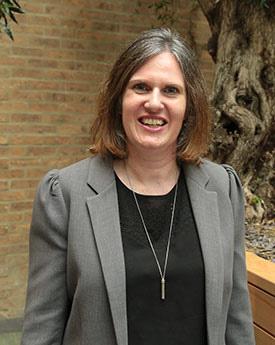

A proposal was made to the Faculty Employability Forum to apply for widening participation research internship funding. We appointed two second year Psychology students to conduct the research, supervised by ourselves and the Programme Manager for Engineering
They designed a survey to explore student views on employer activities and communication. They obtained respondents from across the university through their own student networks, other research interns and careers social media channels 111 students completed their survey (up from 17 when staff conducted a similar survey)
The survey analysis resulted in some key findings and recommended actions
Preferred employer activities identified by students were in person
Timetabled events would improve engagement, indicate importance, and act as a reminder to attend
Targeted communication via emails and social media were preferred to general all student communications
Conducting student led research in this way has led to very positive outcomes in terms of our own understanding of where we can implement change As staff, it has re connected us with our student body, and it has given a valuable internship experience to two of our students.
“I’m happy we could contribute even a little bit to the work you are successful at doing for years. This piece of research helped me a lot and it’s a highly valuable experience for my future.“
Natalia Sienkiewicz, Student Research Intern
“I learned a lot during my internship. It was a wonderful opportunity. I'm very happy with the success of our research and I'm looking forward to presenting it to the Employabillity Forum in November 2022.”
Naomi Godber, Student Research Intern
The student led research outcomes have informed and supported our planning for 2022 23 Most employer events will be held in person and will not be recorded, as evidence showed us that recordings were not being watched and were a possible deterrent to attending


We are in discussions with departments about the possibility of linking employer events to students modules/timetabling Departmental social media and communication channels are being utilised to highlight relevant activities We will be measuring the outcomes of these initiatives by the number of students attending events that we host, and the number of students from the Faculty of Science and Technology attending the annual careers fair
Inspired by the benefits that students might gain from being more involved in event delivery, two events assistant roles have been created to support setting up and hosting a series of lunchtime careers talks for Lancaster Environment students
One role is employer communication, and one is student communication The students will take turns to greet and introduce employers presenting the sessions Students will increase their network through corresponding with and meeting the employers individually and will gain confidence from introducing employers to the audience each week We also hope to benefit from increased student engagement through student led communications for the talks
These volunteer roles are designed to take no more than two to three hours each week and can contribute to various university programmes with a volunteering element We will work with the department to convert them to internship roles for the next academic year.
We have reinstated employing Student Ambassadors to target communication to each department in the Faculty of Science & Technology about the upcoming on campus careers fair Budget for this was not available during Covid.
Our recent Careers in Financial Services talk is the first event we have hosted where we have put our research outcomes to the test This talk attracted approximately 70 students pre pandemic Last year, 20 students attended a hybrid version, where in person, online and recordings were the options for participating in this session It was timetabled for third year students
This year, the session was timetabled for third year and postgraduate students It was held only in person, with no recording, and the invitation to attend was extended to all students in the department, with refreshed marketing materials created to promote it The department was hoping to attract at least 50 students by introducing these changes
The resulting 150 students who attended on the day filled the room to overcapacity We now have the pleasant problem of needing to find a bigger room for the subsequent planned talks
It is early days in measuring the impact of our student led initiatives, but an increase of 650% attendance is not something you get to say very often It is validation that listening to the voice of our students when planning employer engagement activities is critical to remaining relevant The changes we have implemented have been relatively minor, but with significant impact It is hard to beat the buzz of students eager to engage, and certainly gives a boost in morale to staff and employers that we may have turned a corner in our ability to reach our students
Listening to the voice of our students in our employer engagement activities is critical to remaining relevant
Another defining feature of professions is their initial professional training. In the 20th century, HE career services often employed industry specialists rather than trained career advisers. In the 21st century, it has become more common for practitioners to have professional training. Some are trained through AGCAS structures, including qualifications currently hosted at the University of Warwick. That said, there are many practitioners in university settings who have attended initial professional training programmes linked to the Career Development Institute (CDI) at other universities and achieved a QCD or equivalent qualification So, for some practitioners in HE their professional identity is defined by a professional qualification shared with a wider professional community
PROFESSOR PETE ROBERTSON, Edinburgh Napier University, responds to the recent issue of Phoenix which focused on professionalism. He asks whether career development in higher education is a separate profession or part of a wider careers profession. Exploring some of the overlaps, he challenges the practitioners in higher education to think through the implications of their position
Issue 165 of Phoenix (July 2022) addressed professionalism There were articles about the notion of professionalism, the training of practitioners, and the operation of quality assurance frameworks for higher education (HE) career services All good stuff, but one thing was striking in its absence from the discussion of professionalism in HE careers work the elephant not in the room
What I am referring to is the relationship between the profession in HE, and the profession in other sectors across the UK This is not straightforward, and it does raise some difficult questions This article very briefly highlights some of these

Arguably one of the defining features of a profession is its ‘regulatory bargain’ with government In return for a certain privilege and status, a profession agrees to accept responsibility for self regulation, and the associated costs This bargain has been difficult to establish in career development in the UK (Gough & Neary, 2020) Different sectors are at different points on a journey towards, or sometimes slipping away from, professionalisation It is hard to make progress on a regulatory bargain without the participation of the HE sector in a unified profession For example, in the event that the wider careers profession chooses to pursue chartered status something that is currently being explored then this might be hard to achieve without a definition of unified profession that encompasses HE
Unlike services in schools and for young people, HE careers services are relatively sheltered from government policy that directly addresses policy for career service delivery (although there are other institutional and sectoral pressures that shape services) But what happens when policymakers begin to see HE career services as part of a national eco system, and expect them to conform to a wider vision for service design? This is exactly what is happening in Scotland, driven by Skills Development Scotland (SDS), the national careers service, but with the support of the Scottish Government (SDS, 2022) Will HE services comply or simply ignore these expectations?
Careers work in the HE sector consistently delivers to a high standard and mutual support between practitioners and services is exemplary: other sectors could learn a lot from this. It is better resourced than services in other post school sectors. But relative to this strength, the HE sector makes little proactive contribution to the wider careers community in the UK. If you take the view that HE careers work is part of a wider community, then the question that logically follows is: what responsibilities does that relationship entail?
p.robertson@napier.ac.uk
Is careers work in higher education a separate profession, or is it part of a wider career development profession in the UK?


The last few years have demonstrated how near impossible it is to predict the future. Yet this is what many employers seek to do each year when setting hiring targets for their graduate programmes.
A global pandemic, economic downturn and political instability can all have a negative impact on recruitment decisions, so what does this mean for students’ and graduates’ career planning?
We recently held a series of events for careers advisors and employers to provide insight to the graduate labour market and what we should expect for the year ahead If you missed them, you will be able to catch up with them on Luminate Here are three of the key takeaways
The Office for Budget Responsibility (OBR) confirmed the UK has fallen into a recession This typically hits new entrants to the jobs market the hardest and there’s an exodus of older workers Recruitment schemes, work experience and training programmes are reduced, and graduate unemployment goes up
Historically, the jobs market starts to fall off once it becomes plain that things will be difficult, continuing to slide for several quarters, before slowly getting back on its feet
However, in the last recession, the graduate labour market was, by some distance, the least affected part of the labour market This is because most graduate recruiters have learned the hard way in the past that cutting training schemes only hurts them when recovery comes around
Like all downturns, there will be unique features One of the fallouts of the pandemic has been staff shortages This year the Institute of Student Employers (ISE) annual recruitment survey reported that around one in ten graduate vacancies are unfilled and 40% of employers are finding it difficult to fill graduate jobs
This is the first time that we are entering a recession with a labour shortage. This suggests that recruitment decisions may not quite follow the same pattern as they have historically.
The UK labour market proved itself remarkably adaptable and resilient during the pandemic, and it didn’t just outperform the worst case scenarios, it pretty much outperformed the best cases as well. In the case of UK graduates, despite the worst hiring environment we can remember in June 2020, the large majority of that year ’ s graduates got jobs, and good jobs at that
There is no reason to believe that a recession this time around wouldn't follow a similar pattern and that most graduates would find work
That said, some graduates would be hit worse than others not always the ‘usual suspects’ in the arts but those in fields most exposed to large reductions in spending, often engineers and graduates in construction These are, however, often the first to see an upturn in recruitment
Graduates would be less affected than people without their level of qualification The only thing worse than being a graduate in a recession is being a non graduate in a recession
The shape of the labour market and the way we work will be different in a couple of years to the way we work now Time and time again, graduates have shown they have the resilience and adaptability to take to and thrive in new and changed circumstances
It’s important that we continue to support and back students and graduates so that they can adapt and thrive this time as well This year ’ s What do graduates do? publication, written in collaboration with careers advisors, is due to launch over the coming weeks This provides a wealth of advice and information to help understand what graduates can do with their degree We will also be adding the new data to our student facing services including What can I do with my degree? on prospects ac uk

Prospects Luminate
Prospects
Professor in Organisational Psychology at City, University of London, shares her latest digest of careers related research


Soares, J , Carvalho, C , & Silva, A D (2022) A systematic review on career interventions for university students: Framework, effectiveness, and outcomes. Australian Journal of Career Development, 31(2), 81 92
Soares and colleagues have been looking for research that evaluates career interventions in higher education (HE) across the world They found over 500 articles published since 2000 that focused on career support in HE, but when they narrowed it down to studies that offered some empirical evaluation of real interventions, they ended up with just 26 papers, out of which only two were conducted in the UK As well as highlighting concerns about the total number of evaluations that have been published, Soares et al.’s paper also raises some questions about the relevance of these studies. The career interventions that were evaluated ranged from 40 minutes to 480 minutes per session, and not a single one looked at isolated sessions their interventions ranged from 2 to 36 sessions. Given that many career interventions in HE in the UK are fairly short and often one off, we could ask whether these evaluative studies are useful in our context at all. More positively, the authors conclusively reported that career interventions work. The studies showed that the interventions had a positive impact on students’ career self efficacy, career decision making, career planning, job hunting skills, career exploration, adaptability, perceived employability and optimism. The message is that yes, career interventions do work and have a wide range of benefits, but we desperately need more real world evidence that reflects the context and approaches we use
Jackson, D., & Tomlinson, M. (2022). The relative importance of work experience, extra curricular and university based activities on student employability Higher Education Research & Development, 41(4), 1119 1135
This study looked at a group of UK and Australian students to see what kind of activities made them feel more employable The authors found that the more closely the activity related to their career plans, the more useful the students thought it was Only a quarter of students engaged in extra curricular activities at university because they did not see how these activities could benefit their future careers and could not see what value the activities would bring beyond their intrinsic enjoyment The authors suggest that career practitioners could usefully spend time explaining the importance of extra curricular activities to students and highlighting the transferable skills they offer 40% of the students surveyed reported that they engaged in career service events (which seems like a pleasing proportion), and nearly half of the students engaged in activities that were explicitly linked to their own career development, most commonly internships Overall, the activities helped students with their career development through increased confidence in their understanding of the labour market and increased perceptions of their own employability
Bayerlein, L., Hora, M. T., Dean, B. A., & Perkiss, S. (2021). Developing skills in higher education for post pandemic work Labour & Industry: a journal of the social and economic relations of work, 31(4), 418 429

This study focused on the kinds of skills that graduates now need to offer in our new post pandemic, hybrid workplaces Bayerlein and colleagues discuss the seismic changes that we have seen in the physical work arrangements, the way we define workplace interactions and our engagement with customers, and they explain that these changes are likely to have a long lasting and profound impact on the way we work Our graduates will need an enhanced set of skills to navigate these new working practices and the article discusses ways to ensure that our graduates are equipped with the technological and remote working skills that they need, on top of everything else we are supposed to teach them The authors argue that the best mechanism through which to teach these skills is work integrated learning within the curriculum, through placement based experiences or in class activities that reflect authentic work scenarios They point out the importance of activities that connect students to current workplace practices and note the increase in digital work integrated learning opportunities such as virtual internships. The authors explain that because many HE lecturers have limited experience of other workplaces, they are not well placed to educate students in the new ways of working and suggest that universities will need to invest substantially in order to find the best ways to ensure that graduates are offered the right balance of skills training.
Budjanovcanin, A , & Woodrow, C (2022) Regretting your occupation constructively: A qualitative study of career choice and occupational regret Journal of Vocational Behavior, 103743.
Based on in depth interviews with 51 regretful workers, Budjanovcanin and Woodrow have developed a model of career regret the emotion we experience when believing that our current career situation would be better, had we made a different decision earlier on The authors have identified five career regret profiles:
Early Responders identify their career regret early on, and make a decision to do something about it, changing their occupation before much time has passed Stagnators are people who have lived with their career regret for some time, but have not done much to address it They actions are more often focused on mitigating the effects of the regret, so they might focus on taking holidays or retail therapy rather than re training or changing careers Crystallisers often start off as Stagnators, but have a moment of clarity in which they fully understand what has happened to them, and realise what it is they need to do to change it. These are likely to respond by changing their occupation.
Reconcilers are those who, after a period of regret come to understand what has led to their regret but make their peace with their situation rather than trying to change it.
Explorers are pro actively addressing their career regret, through exploring alternative career options with a career coach, or perhaps taking a course to develop a new skill.
This taxonomy could be useful to those of us working with career changers to help them recognise where they are right now, and what they might need to do next
julia.yates.1@city.ac.uk
Edinburgh Napier University
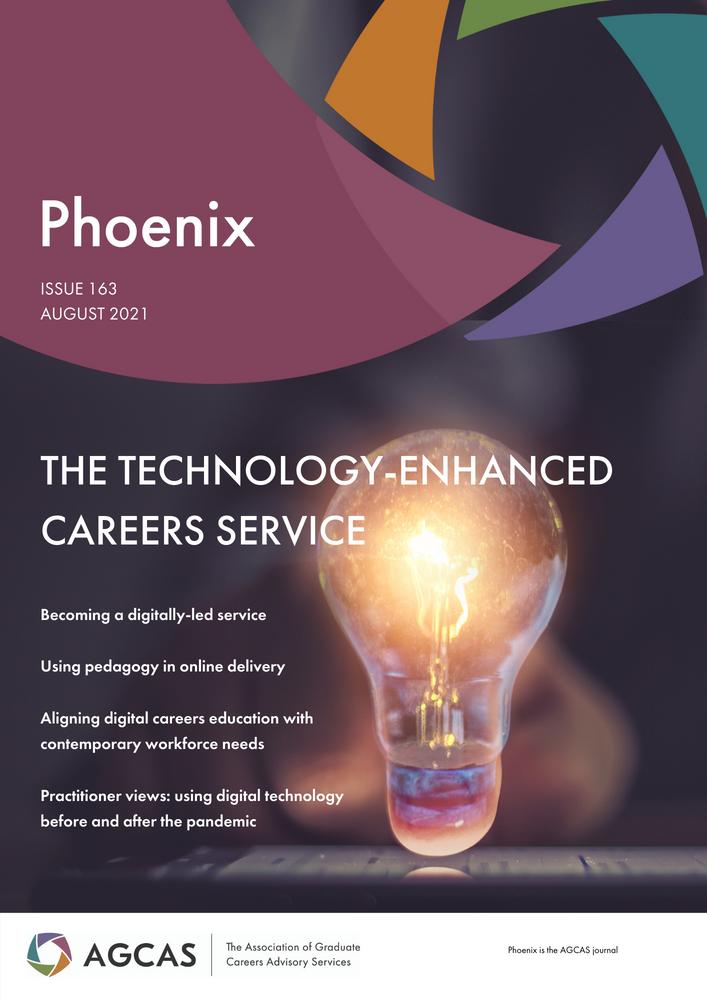



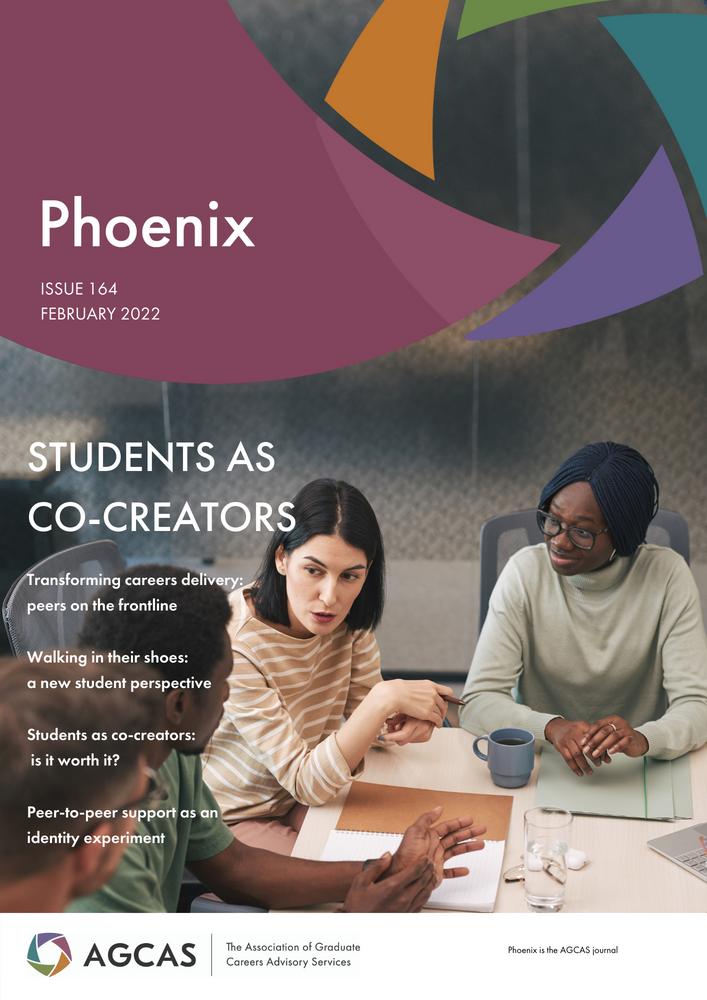
Kingston University
Leeds Arts University
Lancaster University
Manchester Metropolitan University
Nottingham Trent University
Queen Mary University of London
Trinity College Dublin
University of Bath
University of Liverpool
University of Nottingham
University of St Andrews
University of West London
University of Westminster
University of York